Driver_Utilities.c File Reference
Most Input/Output utility & related functions. More...
#include "driver_utilities.h"
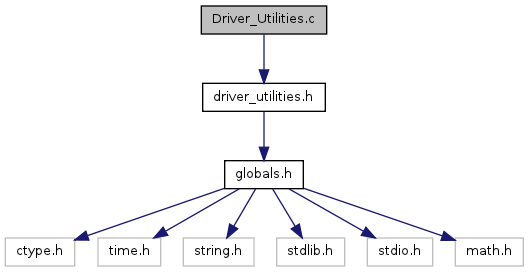
Go to the source code of this file.
Functions | |
| void | read_model_parameters (char *s_parm_name, int s_parm_relval) |
| Call functions to read model parameters from datafiles. | |
| ViewParm * | read_output_parms () |
| Call the read_output_parms function. | |
| ViewParm * | readOutlist (int size) |
| Get the file to configure model output. | |
| int | readViewParms (FILE *vpFile, int size, ViewParm **ppview) |
| Read/process the command-parameters to configure model output. | |
| void | make_more_points (ViewParm *vp, int ptIncr) |
| Allocate memory & set up another set of point-locations for output. | |
| void | calc_maxmin (ViewParm *vp, void *Map, char Mtype, char *mName, int step) |
| Calculate maximum & minimum values in model output arrays. | |
| void | setup_grid () |
| Provide the 2D array size for the model domain. | |
| void | write_output (int index, ViewParm *vp, void *Map, const char *filename, char Mtype, int step) |
| Determine which functions to call for model output. | |
| int | write_map_file (const char *filename, VOIDP Map, char Mtype, int index, float scale_value, float offset_value, int bSize, unsigned char type, const char *thisvarUnits, int outstep, char *ncFileName) |
| Prepare the file and the data for writing output of map (array). | |
| int | read_map_file (const char *filename, VOIDP Map, unsigned char Mtype, float scale_value, float offset_value) |
| Get the file and read/convert the data of map (array). | |
| void | enc_Nb (UCHAR **sptr, SLONG value, int bytes) |
| Place data in bytes into a buffer to assemble a binary array. | |
| void | quick_look (void *Map, char *name, unsigned char Mtype, int xc, int yc, int range, unsigned char format) |
| Prepare data and write heading for writing a data window in debug file. | |
| void | writeWindow (void *fValue, char *vName, char *desc, int x0, int y0, int N0, int N1, int index, UCHAR Mtype, UCHAR format) |
| Prepare a local data set for writing a local data window in debug file. | |
| int | iclip (int x0, int min, int max) |
| Constrain x0 value within a min and a max. | |
| void | Copy (void *src, void *dst, int w, int n, int sw, int dw) |
| Memory-copy data from large (global) domain to local domain. | |
| void | set_env_vars (void) |
| Acquire necessary environment variables. | |
| void | print_point (ViewParm *vp, void *Map, char Mtype, char *mName, int tIndex, int vpindex) |
| Print data at point locations to memory (not to file/disk yet). | |
| void | read_map_dims (const char *filename) |
| Establish the number of rows and columns of the model. | |
| void | init_pvar (VOIDP Map, UCHAR *mask, unsigned char Mtype, float iv) |
| Initialize a variable to a value. | |
| void | print_loc_ave (Point3D *vt, void *Map, char Mtype, char *mName, int tIndex) |
| Calculate summary statistics to determine local average. | |
| void | PTS_SetFields (PTSeries *thisStruct, int ix, int iy, int index, int format, int col) |
| Point Time Series interpolation (unused): set up the fields. | |
| void | PTS_Free (PTSeries *thisStruct) |
| Point Time Series interpolation (unused): free up memory. | |
| void | PTS_CopyFields (PTSeries *thisStruct, PTSeries pV) |
| Point Time Series interpolation (unused): copy fields. | |
| PTSeriesList * | PTSL_Init (int nSlots, int format) |
| Point Time Series interpolation (unused): initialize structure. | |
| void | PTSL_AddpTSeries (PTSeriesList *thisStruct, int x, int y, int index, int seriesNum, int col) |
| Point Time Series interpolation (unused): add to the series. | |
| void | PTSL_Free (PTSeriesList *thisStruct) |
| Point Time Series interpolation (unused): free up memory. | |
| float | PTSL_GetInterpolatedValue0 (PTSeriesList *thisStruct, int x, int y, int step) |
| Point Time Series interpolation (unused): at point, calculate inverse distance squared interpolation (restricted, not using pow() function). | |
| void | PTSL_ReadLists (PTSeriesList *thisStruct, const char *ptsFileName, int index, float *timeStep, int *nPtTS, int col) |
| Point Time Series interpolation (unused): read raw point data. | |
| void | PTSL_CreatePointMap (PTSeriesList *pList, void *Map, unsigned char Mtype, int step, float scale) |
| Point Time Series interpolation (unused): generate interpolated spatial (map) data. | |
| float | PTSL_GetInterpolatedValue1 (PTSeriesList *thisStruct, int x, int y, int step) |
| Point Time Series interpolation (unused): at point, calculate inverse distance interpolation (unrestricted power of distance). | |
| void | RP_SetFields (RPoint *thisStruct, int ix, int iy, float r, float value) |
| Point Time Series interpolation (unused):. | |
| void | RP_CopyFields (RPoint *thisStruct, RPoint *that) |
| Point Time Series interpolation (unused):. | |
| void | RP_SwapFields (RPoint *thisStruct, RPoint *that) |
| Point Time Series interpolation (unused):. | |
| RPointList * | RPL_Init (int nPoints) |
| Point Time Series interpolation (unused):. | |
| void | RPL_AddrPoint (RPointList *thisStruct, int x, int y, float r, float value) |
| Point Time Series interpolation (unused):. | |
| void | RPL_Sort (RPointList *thisStruct) |
| Point Time Series interpolation (unused):. | |
| void | RPL_Free (RPointList *thisStruct) |
| Point Time Series interpolation (unused):. | |
| void | setFlag (ViewParm *vp, UINT mask, int value) |
| (Effectively unused). From Model.outList data, set a flag indicating array or not | |
| int | getFlag (ViewParm *vp, UINT mask) |
| Unused (never called) function. | |
| void | setPrecision (ViewParm *vp, int value) |
| (Effectively unused). | |
| int | getPrecision (ViewParm *vp) |
| (Effectively unused). | |
| int | check_for (char *s0, const char *s1, int start, int cs, int rp) |
| Check for occurrences of string s1 in string s0 after position start. | |
| int | isInteger (char *target_str) |
| Determine if an integer is present in string. | |
| int | isFloat (char *target_str) |
| Determine if a float is present in string. | |
| void | WriteMsg (const char *msg, int wh) |
| Send a message to a debug file or to the console. | |
| void | usrErr0 (const char *dString) |
| Send a message to the console. | |
| void | usrErr (const char *dString) |
| Send a message to the console. | |
| void | Exit (int code) |
| Standard exit from program. | |
| void | fatal (const char *msg) |
| Exit (code=9) from program after sending a message. | |
| double | julday (int mon, int day, int year, int h, int mi, double se) |
| Determine the Julian calendar day from a Gregorian date. | |
| void | calcdate (double jd, int *m, int *d, int *y, int *h, int *mi, double *sec) |
| Determine the Gregorian date from a Julian calendar day. | |
| float | FMOD (float x, float y) |
| Modulus of a pair of (double) arguments. | |
| void | getFloat (FILE *inFile, const char *lString, float *fValPtr) |
| Get a float value following a specific string. | |
| void | getChar (FILE *inFile, const char *lString, char *cValPtr) |
| Get a character following a specific string. | |
| void | getString (FILE *inFile, const char *lString, char *inString) |
| Get a string following a specific string. | |
| void | getInt (FILE *inFile, const char *lString, int *iValPtr) |
| Get an integer following a specific string. | |
| int | find_char (FILE *infile, char tchar) |
| Find a character. | |
| int | Round (float x) |
| truncate (not rounding) to an integer | |
| char * | Scip (char *s, char SYM) |
| Skip ahead in a string until next field. | |
| int | skip_white (FILE *infile) |
| Skip white space(s) in a file. | |
| int | scan_forward (FILE *infile, const char *tstring) |
| Scan forward until a particular string is found. | |
| char * | name_from_path (char *name) |
| Get the var name from a longer path/filename. | |
| VOIDP | nalloc (unsigned mem_size, const char var_name[]) |
| Allocate memory for a variable. | |
| float | Normal (float mean, float sd) |
| Unused, never called. Normal distribution. | |
| int | Poisson (float mu) |
| Unused, never called. Poisson distribution. | |
| void | link_edges (VOIDP Map, unsigned char Mtype) |
| Effectively unused in serial (non-parallel) implementation. | |
| void | setup_platform () |
| Effectively unused in serial (non-parallel) implementation. | |
Detailed Description
Most Input/Output utility & related functions.
This source file contains a large number of functions used in "utility" tasks that generally relate to I/O, set-up of the simulation environment, etc.
Major categories of functions are (roughly) grouped in this order:
1) Output
2) Parameter and other data input
3) Spatial interpolation
4) Routine tasks (parsing text, values, error conditions, etc)
5) [effectively unused] Calls/definitions for parallel (not serial) implementation
Note: documented with Doxygen, which expects specific syntax within special comments.
The Everglades Landscape Model (ELM).
last updated: June 2008
Definition in file Driver_Utilities.c.
Function Documentation
| void read_model_parameters | ( | char * | s_parm_name, | |
| int | s_parm_relval | |||
| ) |
Call functions to read model parameters from datafiles.
- Parameters:
-
s_parm_name Name of the sensitivity parameter being varied for this run s_parm_relval Indicator of current value of relative range in sensitivity parm values: nominal (0), low (1), or high (2)
Definition at line 39 of file Driver_Utilities.c.
References msgStr, ReadGlobalParms(), ReadHabParms(), ReadModExperimParms(), usrErr(), usrErr0(), and WriteMsg().
Referenced by main().
00039 { 00040 00041 sprintf(msgStr,"Reading global parameters..."); 00042 WriteMsg(msgStr,1); 00043 usrErr0(msgStr); 00044 00045 ReadGlobalParms(s_parm_name, s_parm_relval); 00046 sprintf(msgStr,"done."); 00047 WriteMsg(msgStr,1); 00048 usrErr(msgStr); 00049 00050 sprintf(msgStr,"Reading habitat-specific parameters..."); 00051 WriteMsg(msgStr,1); 00052 usrErr0(msgStr); 00053 00054 ReadHabParms(s_parm_name, s_parm_relval); 00055 sprintf(msgStr,"done."); 00056 WriteMsg(msgStr,1); 00057 usrErr(msgStr); 00058 00059 /* v2.6 - don't write message to console until later (when determine if parm file is used or not) */ 00060 ReadModExperimParms(s_parm_name, s_parm_relval); 00061 00062 }
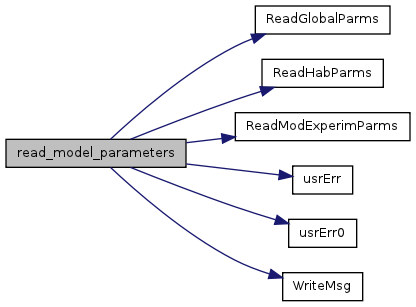
| ViewParm* read_output_parms | ( | void | ) |
Call the read_output_parms function.
- Returns:
- pointer to struct of ViewParm
Definition at line 66 of file Driver_Utilities.c.
References Outlist_size, and readOutlist().
Referenced by main().
00066 { 00067 /* need to change the Outlist_size (#defined in header) if adding outlist variables to the data struct in gen_output of UnitMod.c */ 00068 ViewParm* v = readOutlist(Outlist_size); 00069 return v; 00070 }
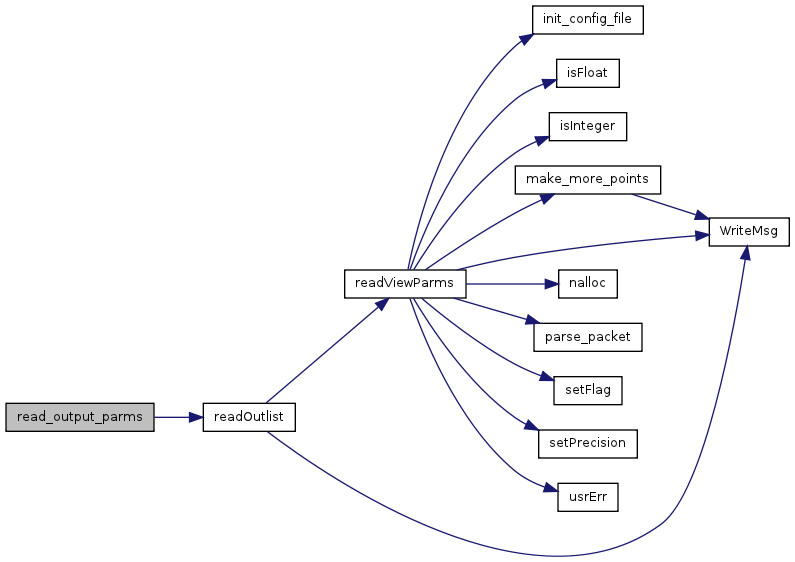
| ViewParm* readOutlist | ( | int | size | ) |
Get the file to configure model output.
- Parameters:
-
size Outlist_size, the number of variables in model outlist
- Returns:
- pointer to struct of ViewParm
Definition at line 75 of file Driver_Utilities.c.
References cnfgFile, H_OPSYS, modelFileName, ModelPath, msgStr, ProjName, readViewParms(), UNIX, and WriteMsg().
Referenced by read_output_parms().
00076 { 00077 int Npt; 00078 ViewParm* vp; 00079 FILE *cnfgFile; 00080 00081 if(H_OPSYS==UNIX) sprintf(modelFileName,"%s/%s/RunParms/Model.outList",ModelPath,ProjName); 00082 else sprintf(modelFileName,"%s%s:RunParms:Model.outList",ModelPath,ProjName); 00083 cnfgFile = fopen(modelFileName, "r"); 00084 if (cnfgFile == NULL) { 00085 sprintf(msgStr, "Error, can't open file %s", modelFileName); 00086 WriteMsg(msgStr, 1); exit(-1);} 00087 00088 Npt = readViewParms(cnfgFile,size, &vp); 00089 return vp; 00090 00091 }
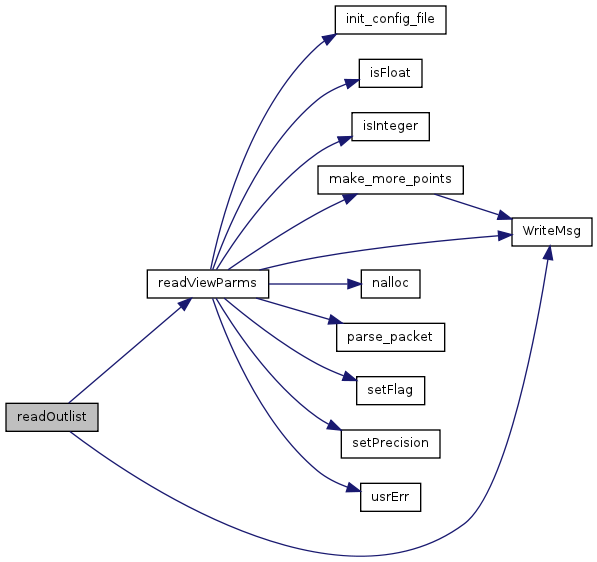
| int readViewParms | ( | FILE * | vpFile, | |
| int | size, | |||
| ViewParm ** | ppview | |||
| ) |
Read/process the command-parameters to configure model output.
The configuration file (Model.outList) is read to process the type (e.g., spatial maps, point time series, debug windows) and frequency (constant intervals of time) of model output.
- Parameters:
-
vpFile Pointer to the Model.outList configuration file size Outlist_size, the number of variables in model outlist ppview Struct of ViewParm output configuration data
- Returns:
- value of Outlist_size
Definition at line 105 of file Driver_Utilities.c.
References avg_Intvl, viewParm::bounds, CalMonOut, debug, viewParm::fileName, point3D::format, gCArg, init_config_file(), ISARRAY, isFloat(), isInteger(), make_more_points(), viewParm::mapType, viewParm::maxPoints, msgStr, nalloc(), viewParm::nPoints, scale1::o, parse_packet(), viewParm::points, scale1::s, viewParm::scale, setFlag(), setPrecision(), viewParm::step, point3D::type, usrErr(), viewParm::varUnits, view, scale2::Vmax, scale2::Vmin, WriteMsg(), point3D::x, point3D::y, and point3D::z.
Referenced by readOutlist().
00106 { 00107 char test; 00108 char cmd; 00109 int index=0, ix, iy, iz, i, nArgs, precision, format=0, Ocmd; 00110 float x,y; 00111 ViewParm *vp, *view; 00112 00113 format = init_config_file(vpFile, '#', '*', '@', '~'); 00114 view = (ViewParm *)nalloc(size * sizeof(ViewParm), "view"); 00115 *ppview = view; 00116 00117 for (i = 0; i < size; i++) { 00118 vp = view+i; 00119 vp->scale.s = 1.0; 00120 vp->scale.o = 0.0; 00121 vp->step = 0; 00122 Ocmd=0; 00123 vp->nPoints = 0; 00124 vp->points = NULL; 00125 vp->maxPoints = 0; 00126 vp->mapType = 'N'; 00127 precision = 1; 00128 setPrecision(vp,precision); 00129 } 00130 00131 while(1) { 00132 index = parse_packet(vpFile, &nArgs, &test);/*fix*/ 00133 if( index == -1) break; 00134 if( index == -3) break; 00135 if(index >= size) { 00136 fprintf(stderr,"\n Read index Error in configuration: index out of range: %d ", index); 00137 break; 00138 } 00139 if( index == -2) break; 00140 else { 00141 vp = view+index; 00142 strncpy(vp->fileName,gCArg[0],23); 00143 vp->fileName[23]='\0'; 00144 if( test == '*' ) setFlag(vp,ISARRAY,1); 00145 else if (test == '@') setFlag(vp,ISARRAY,0); 00146 else { 00147 sprintf(msgStr," %s: Syntax Error in configuration, test char = %c ",gCArg[0],test); 00148 usrErr(msgStr); 00149 break; 00150 } 00151 if(debug && gCArg[1][0] != 'U') { 00152 sprintf(msgStr,"\nReading Output Config for %s: Nargs = %d, CMD0 = %c index = %d", 00153 gCArg[0],nArgs,gCArg[1][0],index); 00154 WriteMsg(msgStr,1); 00155 } 00156 cmd = gCArg[1][0]; 00157 switch (cmd) { 00158 case 'U': /* v2.8.2 - new "command" for variables' units; this is actually not a "command" for requesting output, but simply uses the command syntax to encapsulate the string of units */ 00159 strncpy(vp->varUnits,gCArg[2],23); 00160 vp->varUnits[23]='\0'; 00161 if(debug > 3) { 00162 sprintf(msgStr,"\n%s Output Config: Units= %s",gCArg[0],gCArg[2]); 00163 WriteMsg(msgStr,1); 00164 } 00165 00166 break; 00167 case 'O': 00168 if( isInteger(gCArg[2]) ) { ix = atoi(gCArg[2]); } 00169 else fprintf(stderr," %s: Syntax Error in configuration ",gCArg[0]); 00170 if(debug) { 00171 sprintf(msgStr,"\n%s Output Config: O(%d)",gCArg[0],ix); 00172 WriteMsg(msgStr,1); 00173 } 00174 vp->step = ix; Ocmd=1; 00175 /* TODO: develop flexible output of calendar-based and julian-based outsteps (jan 11, 2005) */ 00176 /* kluge here in checking use of Model.outList outstep relative to Driver.parm avg_Intvl */ 00177 if (vp->step == CalMonOut && avg_Intvl != 0) { 00178 sprintf(msgStr,"\n***ERROR in Model.outList & Driver.parm integration: Driver.parm's avg_Intvl must be 0 for calendar-based Outstep of %s.",gCArg[0]); 00179 usrErr(msgStr); 00180 exit(-1); 00181 } 00182 00183 break; 00184 case 'A': 00185 if( isInteger(gCArg[2]) && nArgs > 2 ) { ix = atoi(gCArg[2]); } 00186 else { 00187 fprintf(stderr," %s: Syntax Error in configuration ",gCArg[0]); 00188 WriteMsg(msgStr,1); 00189 } 00190 if(debug) { 00191 sprintf(msgStr,"\n%s Output Config: A()",gCArg[0]); 00192 WriteMsg(msgStr,1); 00193 } 00194 vp->mapType = 'H'; 00195 if( Ocmd == 0 ) vp->step = 1; 00196 break; 00197 case 'G': 00198 if ( nArgs > 2 ) { 00199 if( isInteger(gCArg[2]) ) { 00200 vp->mapType = atoi(gCArg[2]); 00201 } 00202 else { vp->mapType =gCArg[2][0]; } 00203 } 00204 if ( nArgs > 3 ) 00205 if( isInteger(gCArg[3]) ) { 00206 precision = atoi(gCArg[3]); 00207 } 00208 if ( nArgs > 4 ) strcpy(vp->fileName,gCArg[4]); 00209 if( precision > 1 && precision < 5 ) setPrecision(vp,precision); 00210 if( Ocmd == 0 ) vp->step = 1; 00211 break; 00212 case 'B': 00213 if( isFloat(gCArg[2]) && isFloat(gCArg[3]) && nArgs > 3 ) { 00214 vp->bounds.Vmax = atof(gCArg[2]); 00215 vp->bounds.Vmin = atof(gCArg[3]); 00216 } 00217 if(debug) { 00218 sprintf(msgStr,"\n Output Config: G(%.1f,%.1f)", 00219 vp->bounds.Vmax, vp->bounds.Vmin); 00220 WriteMsg(msgStr,1); 00221 } 00222 break; 00223 case 'P': 00224 if( isInteger(gCArg[2]) && isInteger(gCArg[3]) && nArgs > 3 ) { 00225 if( (i = (++(vp->nPoints)-1)) >= (vp->maxPoints)) make_more_points(vp,7); 00226 ix = atoi(gCArg[2]); iy = atoi(gCArg[3]); 00227 } 00228 else fprintf(stderr," %s: Syntax Error in configuration ",gCArg[0]); 00229 if(debug) { 00230 sprintf(msgStr,"\n%s Output Config: P(%d,%d), index = %d",gCArg[0],ix,iy,i); 00231 WriteMsg(msgStr,1); 00232 } 00233 vp->points[i].x = ix; 00234 vp->points[i].y = iy; 00235 vp->points[i].type = 'p'; 00236 /* TODO: develop flexible output of calendar-based and julian-based outsteps (jan 11, 2005) */ 00237 /* kluge here in preventing use of point time series output using calendar-based outstep */ 00238 if (vp->step == CalMonOut) { 00239 sprintf(msgStr,"\n***ERROR in Model.outList: sorry, but you can't have point-time series output with calendar-based Outstep of %s. Go yell at Carl!",gCArg[0]); 00240 usrErr(msgStr); 00241 exit(-1); 00242 } 00243 break; 00244 case 'W': 00245 if( isInteger(gCArg[2]) && isInteger(gCArg[3]) && isInteger(gCArg[4]) && nArgs > 4 ) { 00246 if( (i = (++(vp->nPoints)-1)) >= (vp->maxPoints)) make_more_points(vp,7); 00247 ix = atoi(gCArg[2]); iy = atoi(gCArg[3]); iz = atoi(gCArg[4]); 00248 } 00249 else fprintf(stderr," %s: Syntax Error in configuration ",gCArg[0]); 00250 if( nArgs > 5 ) vp->points[i].format = gCArg[5][0]; 00251 vp->points[i].type = 'w'; 00252 vp->points[i].x = ix; 00253 vp->points[i].y = iy; 00254 vp->points[i].z = iz; 00255 if(debug) { 00256 sprintf(msgStr,"\n%s Output Config: W(%d,%d,%d,%c), index = %d", 00257 gCArg[0],ix,iy,iz,vp->points[i].format,i); 00258 WriteMsg(msgStr,1); 00259 } 00260 if( Ocmd == 0 ) vp->step = 1; 00261 break; 00262 case 'S': case 'C': 00263 if( gCArg[1][1] == 'm' || gCArg[1][0] == 'C' ) { 00264 if( isInteger(gCArg[2]) && isInteger(gCArg[3]) && isInteger(gCArg[4]) && nArgs > 5 ) { 00265 if( (i = (++(vp->nPoints)-1)) >= (vp->maxPoints)) make_more_points(vp,7); 00266 ix = atoi(gCArg[2]); iy = atoi(gCArg[3]); iz = atoi(gCArg[4]); 00267 vp->points[i].type = gCArg[5][0]; 00268 } 00269 else fprintf(stderr," %s: Syntax Error in configuration ",gCArg[0]); 00270 vp->points[i].x = ix; 00271 vp->points[i].y = iy; 00272 vp->points[i].z = iz; 00273 if(debug) { 00274 sprintf(msgStr,"\n%s Output Config: Sm(%d,%d,%d,%c), index = %d", 00275 gCArg[0],ix,iy,iz,gCArg[4][0],i); 00276 WriteMsg(msgStr,1); 00277 } 00278 if( Ocmd == 0 ) vp->step = 1; 00279 } 00280 else { 00281 if( nArgs > 2 ) { 00282 if( isFloat(gCArg[2]) ) { x = atof(gCArg[2]); } 00283 else fprintf(stderr," %s: Syntax Error in configuration ",gCArg[0]); 00284 } 00285 if( nArgs > 3 ) { 00286 if( isFloat(gCArg[3]) ) { y = atof(gCArg[3]); } 00287 else fprintf(stderr," %s: Syntax Error in configuration ",gCArg[0]); 00288 } 00289 if(debug) { 00290 sprintf(msgStr,"\n%s Output Config: S(%f,%f)",gCArg[0],x,y); 00291 WriteMsg(msgStr,1); 00292 } 00293 vp->scale.s = x; 00294 vp->scale.o = y; 00295 } 00296 break; 00297 } /* end of switch */ 00298 } /* end of else */ 00299 } /* end of while */ 00300 return size; 00301 }
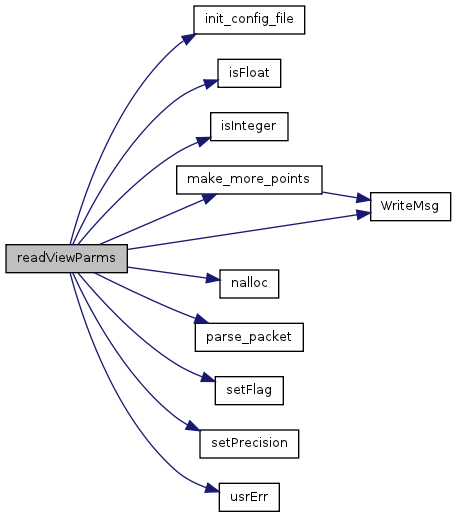
| void make_more_points | ( | ViewParm * | vp, | |
| int | ptIncr | |||
| ) |
Allocate memory & set up another set of point-locations for output.
For each model variable to be output (info in ViewParm struct), increment the number of point-locations (cells) based on the number requested in the model output configuration file.
- Parameters:
-
vp Pointer to struct of ViewParm ptIncr number of points to increment
Definition at line 312 of file Driver_Utilities.c.
References debug, viewParm::fileName, viewParm::maxPoints, msgStr, viewParm::points, point3D::type, WriteMsg(), point3D::x, point3D::y, and point3D::z.
Referenced by readViewParms().
00313 { 00314 Point3D *new_pts; 00315 int i; 00316 00317 new_pts = (Point3D *) malloc( (vp->maxPoints+ptIncr) * sizeof(Point3D) ); 00318 for(i=0; i < vp->maxPoints; i++) { 00319 new_pts[i].x = vp->points[i].x; 00320 new_pts[i].y = vp->points[i].y; 00321 new_pts[i].z = vp->points[i].z; 00322 new_pts[i].type = vp->points[i].type; 00323 } 00324 if( vp->points != NULL ) { free((char*)vp->points); } 00325 vp->points = new_pts; 00326 vp->maxPoints += ptIncr; 00327 if(debug) { 00328 sprintf(msgStr,"Made %d more points for %s for %d total points",ptIncr,vp->fileName,vp->maxPoints); 00329 WriteMsg(msgStr,1); 00330 } 00331 }

| void calc_maxmin | ( | ViewParm * | vp, | |
| void * | Map, | |||
| char | Mtype, | |||
| char * | mName, | |||
| int | step | |||
| ) |
Calculate maximum & minimum values in model output arrays.
For each model variable to be output (info in ViewParm struct), calculate the maximum and minimum values across the variable's spatial array.
- Parameters:
-
vp struct of ViewParm data Map Model variable array data Mtype General output format type mName Variable name step The current iteration number
Definition at line 344 of file Driver_Utilities.c.
References Combine(), viewParm::gScale, kMAXMIN, ON_MAP, s0, s1, T, scale2::Vmax, and scale2::Vmin.
Referenced by write_output().
00345 { 00346 int ix, iy; 00347 float vout[4], ftmp, fmax = -1000, fmin = 1000; 00348 00349 switch(Mtype) { 00350 case 'f' : 00351 for(ix=1; ix<=s0; ix++) 00352 for(iy=1; iy<=s1; iy++) { 00353 if( ON_MAP[T(ix,iy)] ) { 00354 if( (ftmp = ((float*)Map)[T(ix,iy)]) > fmax ) { 00355 fmax = ftmp; 00356 } 00357 if( ftmp < fmin ) fmin = ftmp; 00358 } 00359 } 00360 break; 00361 case 'i' : case 'd' : 00362 for(ix=1; ix<=s0; ix++) 00363 for(iy=1; iy<=s1; iy++) { 00364 if( ON_MAP[T(ix,iy)] ) { 00365 if((ftmp = ((int*)Map)[T(ix,iy)]) > fmax ) fmax = ftmp; 00366 if( ftmp < fmin ) fmin = ftmp; 00367 } 00368 } 00369 break; 00370 case 'c' : 00371 for(ix=1; ix<=s0; ix++) 00372 for(iy=1; iy<=s1; iy++) { 00373 if( ON_MAP[T(ix,iy)] ) { 00374 if( (ftmp = (float)((unsigned char*)Map)[T(ix,iy)]) > fmax ) fmax = ftmp; 00375 if( ftmp < fmin ) fmin = ftmp; 00376 } 00377 } 00378 break; 00379 } 00380 if(step==0) { 00381 vp->gScale.Vmax = fmax; 00382 vp->gScale.Vmin = fmin; 00383 } else { 00384 if( fmax > vp->gScale.Vmax ) vp->gScale.Vmax = fmax; 00385 if( fmin < vp->gScale.Vmin ) vp->gScale.Vmin = fmin; 00386 } 00387 vout[0] = fmax; vout[1] = vp->gScale.Vmax; vout[2] = fmin; vout[3] = vp->gScale.Vmin; 00388 Combine(vout,mName,4,kMAXMIN,step); /* Iterative and cumulative, maximum and minimum values for all window cells at outstep iterations */ 00389 }

| void setup_grid | ( | ) |
Provide the 2D array size for the model domain.
Definition at line 392 of file Driver_Utilities.c.
References exgridsize(), floatOut, gbl_size, gridSize, gTemp, gTempSize, init_pvar(), lcl_size, lcl_start, msgStr, nalloc(), nc_dataRowRev, procnum, s0, s1, and WriteMsg().
Referenced by setup().
00392 { 00393 00394 exgridsize(procnum,gbl_size,lcl_size,lcl_start); /* effectively unused in serial (non-parallel) implementation */ 00395 00396 /* s0 and s1 remain unchanged in serial (non-parallel) implementation */ 00397 s0 = lcl_size[0]; 00398 s1 = lcl_size[1]; 00399 00400 gridSize = (s0+2)*(s1+2); /* the gridSize is increased by 2 in each dimension for buffer strips around processor domain(s) (functional mainly to parallel implementation) */ 00401 00402 sprintf(msgStr,"\nGRID DATA::[ gsize: (%d, %d), lstart: (%d, %d), lend: (%d, %d), lsize: (%d, %d) ]\n", 00403 gbl_size[0], gbl_size[1], lcl_start[0], 00404 lcl_start[1], lcl_start[0]+lcl_size[0]-1, 00405 lcl_start[1]+lcl_size[1]-1, lcl_size[0], lcl_size[1] ); 00406 WriteMsg(msgStr,1); 00407 sprintf(msgStr,"\nVP DATA:: size: (%d), Variable sizes: float: %d, int: %d, long: %d, double: %d\n", 00408 sizeof(ViewParm), sizeof(float),sizeof(int) ,sizeof(long) ,sizeof(double) ); 00409 WriteMsg(msgStr,1); 00410 00411 gTempSize = gridSize*8; 00412 gTemp = (UCHAR*) nalloc(gTempSize,"gTemp"); 00413 00414 /* v2.8.2 new temp array for output - all variables' arrays are 2 rows and 2 cols larger than the actual data 00415 this is used to hold only the size of s0, s1 */ 00416 floatOut = (float *) nalloc(sizeof(float)*(s0+2)*(s1+2),"floatOut"); 00417 // init_pvar(floatOut,NULL,'f',0.0); 00418 00419 /* v2.8.2 new temp array for output - netCDF output files now have origin at lower (not upper) left */ 00420 nc_dataRowRev = (float *) nalloc(sizeof(float)*(s0+2)*(s1+2),"nc_dataRowRev"); 00421 init_pvar(nc_dataRowRev,NULL,'f',0.0); 00422 00423 00424 }
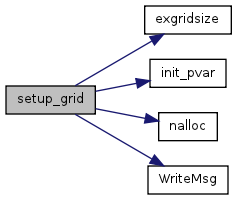
| void write_output | ( | int | index, | |
| ViewParm * | vp, | |||
| void * | Map, | |||
| const char * | filename, | |||
| char | Mtype, | |||
| int | step | |||
| ) |
Determine which functions to call for model output.
- Parameters:
-
index Count index of the output iteration for this variable (may be > step) vp A struct of ViewParm, outlist configuration Map Model variable array data filename Output file name Mtype General output format type step The current output step
Definition at line 435 of file Driver_Utilities.c.
References calc_maxmin(), debug, viewParm::fileName, point3D::format, getPrecision(), viewParm::mapType, msgStr, viewParm::nPoints, scale1::o, viewParm::points, print_loc_ave(), print_point(), quick_look(), scale1::s, viewParm::scale, viewParm::step, point3D::type, viewParm::varUnits, write_map_file(), WriteMsg(), point3D::x, point3D::y, and point3D::z.
Referenced by gen_output().
00437 { 00438 int i; Point3D point; 00439 00440 00441 if(vp->mapType != 'N' ) { 00442 write_map_file((char*)filename,Map,Mtype,index,vp->scale.s,vp->scale.o,getPrecision(vp),vp->mapType,vp->varUnits,vp->step,vp->fileName); /* v2.8.2 added varUnits, vp->step (which is outstep interval), and fileName for netCDF use */ 00443 if (debug > 3) calc_maxmin(vp,Map,Mtype,(char*)filename,step); 00444 } 00445 for(i=0; i< (vp->nPoints); i++ ) { 00446 point = vp->points[i]; 00447 if (debug > 3) { sprintf(msgStr,"\nwriting Out: %s(%d): %c(), index = %d, step=%d\n", filename, i, point.type, index, step ); 00448 WriteMsg(msgStr,1); 00449 } 00450 00451 switch( point.type ) { 00452 case 'm': case 'M': calc_maxmin( vp,Map,Mtype,(char*)filename,step); break; 00453 case 'w': quick_look( Map,(char*) filename, Mtype, point.x, point.y, point.z, point.format ); break; 00454 case 'a': case 's': case 'A': case 'S': print_loc_ave( &point, Map, Mtype, (char*)filename, step ); break; 00455 case 'p': print_point( vp, Map, Mtype, (char*)filename, step, i ); break; 00456 } 00457 } 00458 }
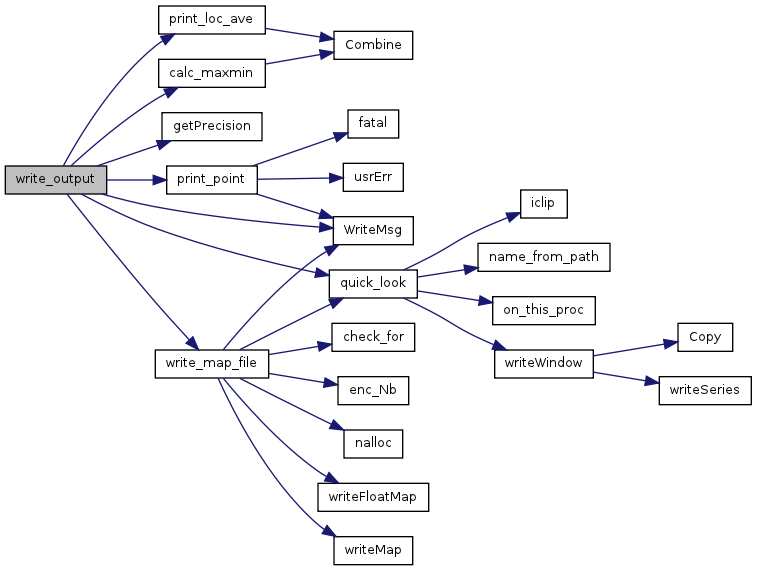
| int write_map_file | ( | const char * | filename, | |
| VOIDP | Map, | |||
| char | Mtype, | |||
| int | index, | |||
| float | scale_value, | |||
| float | offset_value, | |||
| int | bSize, | |||
| unsigned char | type, | |||
| const char * | thisvarUnits, | |||
| int | outstep, | |||
| char * | ncFileName | |||
| ) |
Prepare the file and the data for writing output of map (array).
- Parameters:
-
filename Output file name Map Model variable array data Mtype General output format type index Count index of the output iteration for this variable (may be > step) scale_value Variable-scaling multiplier offset_value Variable-scaling offset bSize The byte size of the output array type The output map storage type thisvarUnits Units of the output variable outstep The output interval time step ncFileName The filename for netCDF output
Definition at line 473 of file Driver_Utilities.c.
References CASE, check_for(), simTime::da, dbgPt, debug, enc_Nb(), END, floatOut, gridSize, gTemp, gTempSize, H_OPSYS, HDF4, simTime::mo, modelFileName, msgStr, nalloc(), NCDF3, offMap_float, ON_MAP, OutputPath, ProjName, quick_look(), s0, s1, SimTime, T, UNIX, writeFloatMap(), writeMap(), WriteMsg(), point2D::x, point2D::y, and simTime::yr.
Referenced by write_output().
00476 { 00477 int i, j, pathType=0; 00478 char ftype[10], gSize; 00479 float ftmp; 00480 SLONG itmp, imax, imin; 00481 UCHAR *mPtr; 00482 char s_mo[3], s_da[3]; 00483 FILE* bFile; 00484 00485 /* below provides old (v1.0) increasing integer, non-date, appendage to filenames */ 00486 /* ftype[0] = '0' + (index / 100); */ 00487 /* ftype[1] = '0' + ((index%100) / 10); */ 00488 /* ftype[2] = '0' + (index % 10); */ 00489 /* ftype[8] = '\0'; */ 00490 00491 /* append the date (yyyymmdd) to the root filename*/ 00492 if (SimTime.mo[0]<10) sprintf(s_mo,"0%d", SimTime.mo[0]); 00493 else sprintf(s_mo,"%d", SimTime.mo[0]); 00494 if (SimTime.da[0]<10) sprintf(s_da,"0%d", SimTime.da[0]); 00495 else sprintf(s_da,"%d", SimTime.da[0]); 00496 sprintf(ftype,"%d%s%s\0",SimTime.yr[0],s_mo,s_da); 00497 00498 if( HDF4 && type=='H' ) sprintf(ftype,".hdf"); 00499 00500 if( NCDF3 && type=='C' ) sprintf(ftype,".nc"); 00501 00502 gSize = gridSize*bSize + 1; 00503 if( gSize > gTempSize ) { 00504 if(gTempSize) free((char*)gTemp); 00505 gTemp = (UCHAR*) nalloc( gSize, "gTemp" ); 00506 gTempSize = gSize; 00507 } 00508 00509 if( H_OPSYS == UNIX ){ 00510 if(check_for((char*)filename, "/", 0, CASE, END ) >= 0 ) { 00511 if(filename[0] != '/' ) pathType = 1; 00512 else pathType = 2; 00513 } 00514 } 00515 else { if(check_for ((char*)filename, ":", 0, CASE, END ) >= 0 ) { if( filename[0] == ':' ) pathType = 1; else pathType = 2; }} 00516 00517 if(type=='H') { /* HDF format */ 00518 switch(pathType) { 00519 case 0: /* No Path */ 00520 if(H_OPSYS==UNIX) sprintf(modelFileName,"%s/%s/Output/HDF/%s%s\0",OutputPath,ProjName,filename,ftype); 00521 else sprintf(modelFileName,"%s%s:Output:HDF:%s%s\0",OutputPath,ProjName,filename,ftype); 00522 break; 00523 case 1: /* Relative Path */ 00524 if(H_OPSYS==UNIX) sprintf(modelFileName,"%s/%s/Output/HDF/%s%s\0",OutputPath,ProjName,filename,ftype); 00525 else sprintf(modelFileName,"%s%s:Output:HDF:%s%s\0",OutputPath,ProjName,filename,ftype); 00526 break; 00527 case 2: /* Full Path */ 00528 sprintf(modelFileName,"%s.hdf\0",filename); 00529 break; 00530 } 00531 } 00532 00533 else if(type=='C') { /* netCDF format */ 00534 switch(pathType) { 00535 case 0: /* No Path */ 00536 if(H_OPSYS==UNIX) sprintf(modelFileName,"%s/%s/Output/NCDF/%s%s\0",OutputPath,ProjName,ncFileName,ftype); 00537 else sprintf(modelFileName,"%s%s:Output:NCDF:%s%s\0",OutputPath,ProjName,ncFileName,ftype); 00538 break; 00539 case 1: /* Relative Path */ 00540 if(H_OPSYS==UNIX) sprintf(modelFileName,"%s/%s/Output/NCDF/%s%s\0",OutputPath,ProjName,ncFileName,ftype); 00541 else sprintf(modelFileName,"%s%s:Output:NCDF:%s%s\0",OutputPath,ProjName,ncFileName,ftype); 00542 break; 00543 case 2: /* Full Path (not used) */ 00544 sprintf(modelFileName,"%s.hdf\0",filename); 00545 break; 00546 } 00547 } 00548 00549 else if(type=='M') { 00550 switch(pathType) { /* M==Map, generic binary (possibly larger than uchar size binary) Format */ 00551 case 0: /* No Path */ 00552 // v2.8.2 changed to varname-specific directory, must be existing directory (user will have to create, for now 00553 if(H_OPSYS==UNIX) sprintf(modelFileName,"%s/%s/Output/%s/%s%s\0",OutputPath,ProjName,filename,filename,ftype); 00554 else sprintf(modelFileName,"%s%s:Output:%s:%s%s\0",OutputPath,ProjName,filename,filename,ftype); 00555 break; 00556 case 1: /* Relative Path */ 00557 if(H_OPSYS==UNIX) sprintf(modelFileName,"%s/%s/Output/%s/%s%s\0",OutputPath,ProjName,filename,filename,ftype); 00558 else sprintf(modelFileName,"%s%s:Output:%s:%s%s\0",OutputPath,ProjName,filename,filename,ftype); 00559 break; 00560 case 2: /* Full Path */ 00561 sprintf(modelFileName,"%s%s\0",filename,ftype); 00562 break; 00563 } 00564 } 00565 else { 00566 bSize = 1; 00567 switch(pathType) { /* Generic Binary Format (uchar, 0-254 ints) */ 00568 case 0: /* No Path */ 00569 if(H_OPSYS==UNIX) sprintf(modelFileName,"%s/%s/Output/Animation%d/%s%s\0",OutputPath,ProjName,type,filename,ftype); 00570 else sprintf(modelFileName,"%s%s:Output:Animation%d:%s%s\0",OutputPath,ProjName,type,filename,ftype); 00571 break; 00572 case 1: /* Relative Path */ 00573 if(H_OPSYS==UNIX) sprintf(modelFileName,"%s/%s/Output/Animation%d/%s%s\0",OutputPath,ProjName,type,filename,ftype); 00574 else sprintf(modelFileName,"%s%s:Output:Animation%d:%s%s\0",OutputPath,ProjName,type,filename,ftype); 00575 break; 00576 case 2: /* Full Path */ 00577 sprintf(modelFileName,"%s%s\0",filename,ftype); 00578 break; 00579 } 00580 } 00581 00582 bSize = (bSize < 1) ? 1 : bSize; 00583 bSize = (bSize > 4) ? 4 : bSize; 00584 if( Mtype == 'c' ) bSize = 1; 00585 00586 /* New for v.2.8.2, providing capability to write (4 byte) floating point output maps. 00587 This may not be elegant, but will get it done for now. The issue is that 00588 the size of the arrays are actually s0+2, s1+2, which will later result in 00589 having larger array sizes for these output maps. Would need to use the equivalent 00590 of enc_Nb to consider only the data in s0,s1 array. */ 00591 if (bSize == 4) { 00592 00593 for (i=0; i< (s0+2); i++) { /* was trying to only resample within 0,s0, but gave up and using whole s0+2 array */ 00594 for (j=0; j< (s1+2); j++) { /* was trying to only resample within 0,s1, but gave up and using whole s1+2 array */ 00595 if( ON_MAP[T(i,j)] ) { /* for resampling, was using T(i+1,j+1) */ 00596 floatOut[T(i,j)] = (( (float*) Map)[T(i,j)]); 00597 } 00598 else { 00599 floatOut[T(i,j)] = offMap_float; /* for resampling */ 00600 // ( (float*) Map)[T(i,j)] = offMap_float; /* arrays were initialized to 0 */ 00601 } 00602 } 00603 } 00604 00605 if ( debug >3) { sprintf(msgStr,"\n\nWriting Float Map %s: no scaling should be used (scale and offset values are ignored, but should be 1 & 0, respectively) scale_value = %f, offset_value = %f, index = %d, filename = %s, type = %c, bSize = %d, pathType = %d, type = %d, units = %s\n", 00606 filename,scale_value,offset_value,index,modelFileName,Mtype,bSize,pathType,type,thisvarUnits); WriteMsg(msgStr,1); } 00607 00608 writeFloatMap(modelFileName,filename,floatOut,bSize,type,index,thisvarUnits,outstep); 00609 /* we're done with writing floats (no scaling done) */ 00610 return(0); 00611 } 00612 00613 00614 if(bSize == 1) { imax = 255; imin = 0; } 00615 else if(bSize == 2) { imax = 255*128; imin = -imax; } 00616 else if(bSize == 3) { imax = 256*256*128; imin = -imax; } 00617 mPtr = gTemp; 00618 00619 if ( debug >3) { sprintf(msgStr,"\n\nWriting Map %s: scale_value = %f, offset_value = %f, index = %d, filename = %s, type = %c, bSize = %d, pathType = %d, type = %d\n", 00620 filename,scale_value,offset_value,index,modelFileName,Mtype,bSize,pathType,type); WriteMsg(msgStr,1); } 00621 00622 for (i=0; i<s0; i++) { 00623 for (j=0; j<s1; j++) { 00624 if( ON_MAP[T(i+1,j+1)] ) { 00625 switch(Mtype) { 00626 case 'l' : 00627 ftmp = ((( (double*) Map)[T(i+1,j+1)] - offset_value) / scale_value); /* v2.3.2 added double (casting to float ftmp) */ 00628 itmp = (int) ftmp; 00629 itmp = (itmp > imax-1) ? imax-1 : itmp; 00630 itmp = (itmp < imin) ? imin : itmp; 00631 break; 00632 case 'f' : 00633 ftmp = ((( (float*) Map)[T(i+1,j+1)] - offset_value) / scale_value); 00634 itmp = (int) ftmp; 00635 itmp = (itmp > imax-1) ? imax-1 : itmp; 00636 itmp = (itmp < imin) ? imin : itmp; 00637 break; 00638 case 'd' : case 'i' : 00639 ftmp = ((( (int*) Map)[T(i+1,j+1)] - offset_value) / scale_value); 00640 itmp = (int) ftmp; 00641 itmp = (itmp > imax-1) ? imax-1 : itmp; 00642 itmp = (itmp < imin) ? imin : itmp; 00643 break; 00644 case 'c' : 00645 itmp = ((unsigned char*) Map)[T(i+1,j+1)]; 00646 itmp = (itmp > imax-1) ? imax-1 : itmp; 00647 itmp = (itmp < imin) ? imin : itmp; 00648 break; 00649 } 00650 } 00651 else itmp = imax; 00652 00653 00654 enc_Nb(&mPtr,itmp,bSize); 00655 00656 } 00657 } 00658 00659 writeMap(modelFileName,gTemp,bSize,type,index); 00660 if(debug) quick_look(Map, (char*)filename, Mtype, dbgPt.x, dbgPt.y, 2,'E'); 00661 return(0); 00662 }
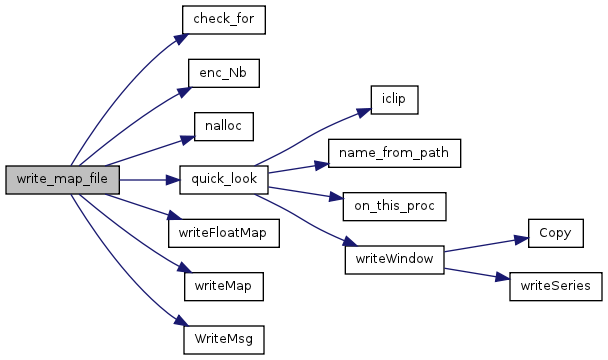
| int read_map_file | ( | const char * | filename, | |
| VOIDP | Map, | |||
| unsigned char | Mtype, | |||
| float | scale_value, | |||
| float | offset_value | |||
| ) |
Get the file and read/convert the data of map (array).
- Parameters:
-
filename Input file name Map Model variable array data Mtype General data format type scale_value Variable-scaling multiplier offset_value Variable-scaling offset
- Returns:
- byte size of data values
Definition at line 674 of file Driver_Utilities.c.
References dbgPt, debug, gridSize, gTemp, gTempSize, lcl_size, link_edges(), msgStr, nalloc(), procnum, quick_look(), readMap(), s0, s1, T, usrErr(), WriteMsg(), point2D::x, and point2D::y.
Referenced by init_dynam_data(), and init_static_data().
00677 { 00678 int i, j, k0, size; 00679 unsigned temp; 00680 UCHAR *tmpPtr, Dsize; 00681 00682 gridSize = (s0+2)*(s1+2); 00683 gTempSize = gridSize*8; 00684 00685 00686 size = gridSize*4 +1; 00687 if( size > gTempSize ) { 00688 if(gTemp) free((char*)gTemp); 00689 gTemp = (UCHAR*)nalloc( size, "gTemp" ); 00690 gTempSize = size; 00691 } 00692 00693 if(debug>2) { 00694 sprintf(msgStr,"Reading %s\n",filename); 00695 usrErr(msgStr); 00696 WriteMsg(msgStr,1); 00697 } 00698 00699 Dsize = readMap(filename,gTemp); 00700 00701 if(debug) { 00702 sprintf(msgStr,"name = %s, proc = %d, scale_value = %f, offset_value = %f, size = %x\n ", 00703 filename,procnum,scale_value,offset_value,Dsize); 00704 WriteMsg(msgStr,1); 00705 } 00706 for (i=1; i<=s0; i++) { 00707 for (j=1; j<=s1; j++) { 00708 k0 = Dsize*((i-1)*lcl_size[1] + (j-1)); 00709 tmpPtr = gTemp+k0; 00710 switch(Dsize) { 00711 case 1: temp = gTemp[k0]; break; 00712 case 2: temp = gTemp[k0]*256 + gTemp[k0+1]; break; 00713 case 3: temp = gTemp[k0]*65536 + gTemp[k0+1]*256 + gTemp[k0+2]; break; 00714 case 4: temp = gTemp[k0]*16777216 + gTemp[k0+1]*65536 + gTemp[k0+2]*256 + gTemp[k0+3]; break; 00715 default: fprintf(stderr,"ERROR, illegal size: %x\n",Dsize); temp = 0; 00716 } 00717 switch (Mtype) { 00718 case 'f' : 00719 ((float*)Map)[T(i,j)] = scale_value*((float)temp)+offset_value; 00720 break; 00721 case 'd' : case 'i' : 00722 ((int*)Map)[T(i,j)] = (int)(scale_value * (float)temp + offset_value); 00723 break; 00724 case 'c' : 00725 ((unsigned char*)Map)[T(i,j)] = (int)(scale_value * (unsigned char)temp); 00726 break; 00727 } 00728 } 00729 } 00730 if(debug) quick_look(Map, (char*)filename, Mtype, dbgPt.x, dbgPt.y, 2,'E'); 00731 link_edges(Map,Mtype); 00732 fflush(stderr); 00733 return Dsize; 00734 }
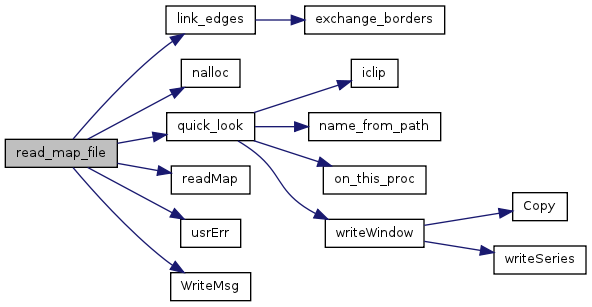
Place data in bytes into a buffer to assemble a binary array.
Place a 1,2,3, or 4 (N) byte signed value into the specified buffer and advance the buffer pointer past the placed object.
- Parameters:
-
sptr a pointer to pointer to UCHAR (the buffer) value The value to place in the buffer bytes Number of bytes in data
Definition at line 761 of file Driver_Utilities.c.
Referenced by write_map_file().
00762 { 00763 UCHAR tmp[4]; 00764 switch(bytes) { 00765 case 1: 00766 *(*sptr)++ = value; 00767 break; 00768 case 2: 00769 *(*sptr)++ = (value >> 8); 00770 *(*sptr)++ = value; 00771 break; 00772 case 3: 00773 tmp[0] = value; 00774 tmp[1] = (value >>= 8); 00775 tmp[2] = (value >> 8); 00776 *(*sptr)++ = tmp[2]; 00777 *(*sptr)++ = tmp[1]; 00778 *(*sptr)++ = tmp[0]; 00779 break; 00780 case 4: 00781 tmp[0] = value; 00782 tmp[1] = (value >>= 8); 00783 tmp[2] = (value >>= 8); 00784 tmp[3] = (value >> 8); 00785 *(*sptr)++ = tmp[3]; 00786 *(*sptr)++ = tmp[2]; 00787 *(*sptr)++ = tmp[1]; 00788 *(*sptr)++ = tmp[0]; 00789 break; 00790 } 00791 }
| void quick_look | ( | void * | Map, | |
| char * | name, | |||
| unsigned char | Mtype, | |||
| int | xc, | |||
| int | yc, | |||
| int | range, | |||
| unsigned char | format | |||
| ) |
Prepare data and write heading for writing a data window in debug file.
- Parameters:
-
Map Model variable array data name Model variable name Mtype General output format type xc Point location x (row!) yc Point location y (col!) range Size range (cells) of window format Numeric format type
Definition at line 802 of file Driver_Utilities.c.
References debug, iclip(), istep, lcl_start, msgStr, name_from_path(), on_this_proc(), recpnum, s0, s1, and writeWindow().
Referenced by read_map_file(), write_map_file(), and write_output().
00804 { 00805 int ymin, ymax, xmin, xmax, x, y, N0, N1; 00806 char* namePtr; 00807 00808 if (!on_this_proc(xc,yc)) return; 00809 x = xc - lcl_start[0] + 1; 00810 y = yc - lcl_start[1] + 1; 00811 xmin = x - range; 00812 xmax = x + range + 1; 00813 ymin = y - range; 00814 ymax = y + range + 1; 00815 xmax = iclip( xmax, 0, s0+2); 00816 xmin = iclip( xmin, 0, s0+2); 00817 ymax = iclip( ymax, 0, s1+2); 00818 ymin = iclip( ymin, 0, s1+2); 00819 N0 = xmax-xmin; 00820 N1 = ymax-ymin; 00821 namePtr = name_from_path(name); 00822 if (debug >3) { 00823 sprintf(msgStr,"Window to Map %s, s=%d, proc0 = %d, proc1 = %d; Corners(gbl): (%d,%d) (%d,%d)\n", 00824 namePtr,range,recpnum[0],recpnum[1],xc-range,yc-range,xc+range+1,yc+range+1); 00825 writeWindow(Map,namePtr,msgStr,xmin,ymin,N0,N1,istep,Mtype,format); 00826 } 00827 00828 }
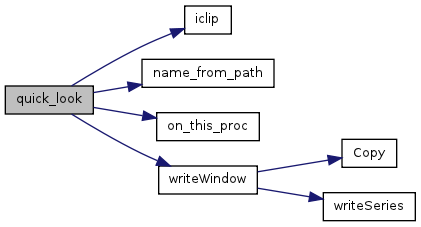
| void writeWindow | ( | void * | fValue, | |
| char * | vName, | |||
| char * | desc, | |||
| int | x0, | |||
| int | y0, | |||
| int | N0, | |||
| int | N1, | |||
| int | index, | |||
| UCHAR | Mtype, | |||
| UCHAR | format | |||
| ) |
Prepare a local data set for writing a local data window in debug file.
- Parameters:
-
fValue Model variable array data vName Model variable name desc Message describing the output x0 Lower x (row!) value y0 Lower y (col!) value N0 Range in x (row!) values N1 Range in y (col!) values index Current iteration number Mtype General output format type format Numeric format type
Definition at line 843 of file Driver_Utilities.c.
References Copy(), gTemp, gTempSize, s1, T, and writeSeries().
Referenced by quick_look().
00846 { 00847 int mSize, size; 00848 char ctemp[200]; 00849 00850 switch(Mtype) { 00851 case 'l': size = sizeof(double); break; /* v2.3.2 added */ 00852 case 'f': case 'L': case 'E': size = sizeof(float); break; 00853 case 'd': case 'i': size = sizeof(int); break; 00854 case 'c': size = sizeof(char); break; 00855 } 00856 if( (mSize=size*N0*N1) > gTempSize ) { 00857 if(gTemp != NULL) free((char*)gTemp); 00858 gTemp = (UCHAR*)malloc(gTempSize=mSize); 00859 } 00860 00861 Copy(((UCHAR*)fValue)+T(x0,y0)*size, gTemp, N1*size, N0, (s1+2)*size, N1*size); 00862 sprintf(ctemp,"(%d)WIND: %s",index,vName); 00863 writeSeries(gTemp,ctemp,desc,N0,N1,Mtype,format); 00864 }

| int iclip | ( | int | x0, | |
| int | min, | |||
| int | max | |||
| ) |
Constrain x0 value within a min and a max.
- Parameters:
-
x0 number to work on min the minimum max the maximum
- Returns:
- result
Definition at line 872 of file Driver_Utilities.c.
Referenced by quick_look().
00873 { 00874 int rv; 00875 rv = ( x0 > max) ? max : x0; 00876 rv = ( rv < min) ? min : rv; 00877 return rv; 00878 }
| void Copy | ( | void * | src, | |
| void * | dst, | |||
| int | w, | |||
| int | n, | |||
| int | sw, | |||
| int | dw | |||
| ) |
Memory-copy data from large (global) domain to local domain.
- Parameters:
-
src The source of info dst The destination of info w The number of characters n The number of (row) repetitions sw The source size in col direction dw The destination size in col direction
- Returns:
- resulting (destination) copy
Definition at line 889 of file Driver_Utilities.c.
Referenced by writeWindow().
00890 { 00891 int i; 00892 for(i=0; i<n; i++) 00893 memcpy( ((UCHAR*)dst)+i*dw, ((UCHAR*)src)+i*sw, w ); /* copy w chars from source to dest, return destination */ 00894 }
| void set_env_vars | ( | void | ) |
Acquire necessary environment variables.
Definition at line 900 of file Driver_Utilities.c.
References DriverPath, ModelPath, msgStr, OS_TYPE, ProjName, and usrErr().
Referenced by setup().
00900 { 00901 00902 FILE *infile; 00903 char filename[100], ch; 00904 static long start; 00905 int i, maxLen =200; 00906 00907 ModelPath = getenv("ModelPath"); 00908 ProjName = getenv("ProjName"); 00909 DriverPath = getenv("DriverPath"); 00910 OS_TYPE = getenv("OSTYPE"); /* OSTYPE not used in code, only here for informational output */ 00911 00912 sprintf(msgStr,"OS type = %s ",OS_TYPE); 00913 usrErr(msgStr); 00914 00915 sprintf(msgStr,"Project Name = %s ",ProjName); 00916 usrErr(msgStr); 00917 00918 }

| void print_point | ( | ViewParm * | vp, | |
| void * | Map, | |||
| char | Mtype, | |||
| char * | mName, | |||
| int | tIndex, | |||
| int | vpindex | |||
| ) |
Print data at point locations to memory (not to file/disk yet).
- Parameters:
-
vp struct of ViewParm output configuration Map Array data of variable Mtype General output format type mName The name of the variable tIndex Current model iteration number vpindex Index of the current point number
Definition at line 929 of file Driver_Utilities.c.
References seriesParm::data, debug, fatal(), lcl_start, seriesParm::Length, seriesParm::Loc, MAX_PTSERIES, msgStr, N_iter, seriesParm::outstep, PListIndex, viewParm::points, pSeries, s0, s1, viewParm::step, T, usrErr(), WriteMsg(), point2D::x, point3D::x, point2D::y, point3D::y, and point3D::z.
Referenced by write_output().
00931 { 00932 int x, y; 00933 Point3D *pt; 00934 00935 pt = vp->points + vpindex; 00936 x = pt->x - lcl_start[0]; 00937 y = pt->y - lcl_start[1]; 00938 if( (x >= 0) && (x < s0) && (y >= 0) && (y < s1) ) { 00939 if(tIndex==0) { pt->z = PListIndex; pSeries[PListIndex].Length=0; 00940 } 00941 else PListIndex = pt->z; 00942 if(tIndex==0) { 00943 /* TODO: develop flexible output of calendar-based and julian-based outsteps (jan 11, 2005) */ 00944 if(PListIndex >= MAX_PTSERIES ) fatal("Too many Point series."); 00945 else if( pSeries[PListIndex].data == NULL ) pSeries[PListIndex].data = (float*) malloc( (N_iter*sizeof(float)/vp->step)+2 ); 00946 if( pSeries[PListIndex].data == NULL ) usrErr("out of Memory for Spatial Timeseries."); 00947 pSeries[PListIndex].Loc.x = pt->x; 00948 pSeries[PListIndex].Loc.y = pt->y; 00949 pSeries[PListIndex].outstep = vp->step; 00950 strcpy(pSeries[PListIndex].name,mName); 00951 if(debug >2) { 00952 sprintf(msgStr,"\nSetup Pointlist %d for %s(%d), step=%d, point=(%d,%d)\n", PListIndex, mName, vpindex, vp->step, x, y ); 00953 WriteMsg(msgStr,1); 00954 } 00955 } 00956 switch(Mtype) { 00957 case 'f' : pSeries[PListIndex].data[ pSeries[PListIndex].Length++ ] = ((float*)Map)[T(x+1,y+1)]; break; 00958 case 'i' : pSeries[PListIndex].data[ pSeries[PListIndex].Length++ ] = ((int*)Map)[T(x+1,y+1)]; break; 00959 case 'c' : pSeries[PListIndex].data[ pSeries[PListIndex].Length++ ] = ((unsigned char*)Map)[T(x+1,y+1)]; 00960 } 00961 if(debug >3) { 00962 sprintf(msgStr,"\nWriting Point %d for %s(%d), point=(%d,%d), value = %f, index = %d\n", 00963 PListIndex, mName, vpindex, x, y, ((float*)Map)[T(x+1,y+1)], pSeries[PListIndex].Length-1 ); 00964 WriteMsg(msgStr,1); 00965 } 00966 PListIndex++; 00967 } 00968 }
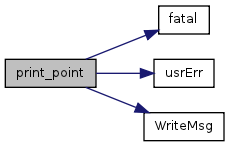
| void read_map_dims | ( | const char * | filename | ) |
Establish the number of rows and columns of the model.
Read the map dimensions of the global model array, establishing rows=s0 and columns=s1
- Parameters:
-
filename character string of the representative map (usually "Elevation")
Definition at line 975 of file Driver_Utilities.c.
References broadcastInt(), debug, Exit(), gbl_size, Lprocnum, modelFileName, ModelPath, msgStr, ProjName, s0, s1, scan_forward(), usrErr(), and WriteMsg().
Referenced by get_map_dims().
00976 { 00977 FILE *file; 00978 00979 if (debug>3) { sprintf(msgStr,"Getting map dims: %s",filename); usrErr(msgStr);} 00980 if(Lprocnum == 1) { 00981 sprintf(modelFileName,"%s/%s/Data/Map_head/%s",ModelPath,ProjName,filename); 00982 file = fopen(modelFileName,"r"); 00983 if(file==NULL) { 00984 fprintf(stderr,"Unable to open map header file %s.\n",modelFileName); 00985 fflush(stderr); 00986 Exit(0); 00987 } 00988 scan_forward(file,"cols:"); 00989 fscanf(file,"%d",&gbl_size[1]); 00990 sprintf(msgStr,"cols = %d\n",gbl_size[1]); WriteMsg(msgStr,1); 00991 scan_forward(file,"rows:"); 00992 fscanf(file,"%d",&gbl_size[0]); 00993 sprintf(msgStr,"rows = %d\n",gbl_size[0]); WriteMsg(msgStr,1); 00994 fclose(file); 00995 } 00996 broadcastInt(gbl_size); /* does nothing in serial (non-parallel) implementation */ 00997 broadcastInt(gbl_size+1); /* does nothing in serial (non-parallel) implementation */ 00998 s0 = gbl_size[0]; 00999 s1 = gbl_size[1]; 01000 }
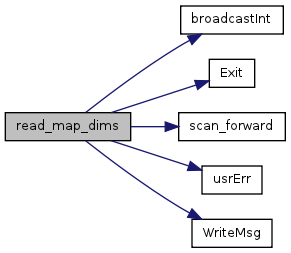
| void init_pvar | ( | VOIDP | Map, | |
| UCHAR * | mask, | |||
| unsigned char | Mtype, | |||
| float | iv | |||
| ) |
Initialize a variable to a value.
- Parameters:
-
Map array of data mask data mask Mtype the data type of the map data iv the value used to initialize variable
Definition at line 1008 of file Driver_Utilities.c.
References numBasn, s0, s1, and T.
Referenced by alloc_hab_hist(), alloc_mem_stats(), alloc_memory(), Canal_Network_Init(), Channel_configure(), and setup_grid().
01009 { 01010 int i0, i1; 01011 01012 switch(Mtype) { 01013 case 'b' : /* added double for (non-map) basin (b) array budget calcs */ 01014 for(i0=0; i0<=numBasn; i0++) { 01015 ((double*)Map)[i0] = iv; 01016 } 01017 break; 01018 case 'l' : /* added double (l == letter "ell" ) for map arrays */ 01019 for(i0=0; i0<=s0+1; i0++) 01020 for(i1=0; i1<=s1+1; i1++) { 01021 if(mask==NULL) ((double*)Map)[T(i0,i1)] = iv; 01022 else if ( mask[T(i0,i1)] == 0 ) ((double*)Map)[T(i0,i1)] = 0; 01023 else ((double*)Map)[T(i0,i1)] = iv; 01024 } 01025 break; 01026 case 'f' : 01027 for(i0=0; i0<=s0+1; i0++) 01028 for(i1=0; i1<=s1+1; i1++) { 01029 if(mask==NULL) ((float*)Map)[T(i0,i1)] = iv; 01030 else if ( mask[T(i0,i1)] == 0 ) ((float*)Map)[T(i0,i1)] = 0; 01031 else ((float*)Map)[T(i0,i1)] = iv; 01032 } 01033 break; 01034 case 'i' : case 'd' : 01035 for(i0=0; i0<=s0+1; i0++) 01036 for(i1=0; i1<=s1+1; i1++) { 01037 if(mask==NULL) ((int*)Map)[T(i0,i1)] = (int)iv; 01038 else if ( mask[T(i0,i1)] == 0 ) ((int*)Map)[T(i0,i1)] = 0; 01039 else ((int*)Map)[T(i0,i1)] = (int)iv; 01040 } 01041 break; 01042 case 'c' : 01043 for(i0=0; i0<=s0+1; i0++) 01044 for(i1=0; i1<=s1+1; i1++) { 01045 if(mask==NULL) ((unsigned char*)Map)[T(i0,i1)] = (unsigned char) '\0' + (int) iv; 01046 else if ( mask[T(i0,i1)] == 0 ) ((unsigned char*)Map)[T(i0,i1)] = '\0'; 01047 else ((unsigned char*)Map)[T(i0,i1)] = (unsigned char) '\0' + (int) iv; 01048 } 01049 break; 01050 01051 default : 01052 printf(" in default case\n"); 01053 break; 01054 } 01055 }
| void print_loc_ave | ( | Point3D * | vt, | |
| void * | Map, | |||
| char | Mtype, | |||
| char * | mName, | |||
| int | tIndex | |||
| ) |
Calculate summary statistics to determine local average.
- Parameters:
-
vt struct of cell points Map Model variable data array Mtype the data type of the map data mName variable name tIndex the current iteration number
Definition at line 1065 of file Driver_Utilities.c.
References Combine(), kAVE, kAVECUM, kSUM, kSUMCUM, lcl_start, ON_MAP, s0, s1, T, point3D::type, point3D::x, point3D::y, and point3D::z.
Referenced by write_output().
01066 { 01067 int ix, iy, x, y, x0, y0, range, xmax, ymax, xmin, ymin, type = 11; 01068 float vout[4]; 01069 double sum = 0, normCoef = 0; 01070 01071 if(Mtype != 'f') { fprintf(stderr,"Warning: Wrong type in Loc Ave: %s(%c)\n",mName,Mtype); return; } 01072 x0 = vt->x; 01073 y0 = vt->y; 01074 range = vt->z; 01075 x = x0 - lcl_start[0]; 01076 y = y0 - lcl_start[1]; 01077 xmin = x - range; 01078 xmax = x + range; 01079 ymin = y - range; 01080 ymax = y + range; 01081 xmax = (xmax > (s0)) ? (s0) : xmax; 01082 xmin = (xmin < 0 ) ? 0 : xmin; 01083 ymax = (ymax > (s1)) ? (s1) : ymax; 01084 ymin = (ymin < 0 ) ? 0 : ymin; 01085 01086 for(ix=xmin; ix<xmax; ix++) { 01087 for(iy=ymin; iy<ymax; iy++) { 01088 if( ON_MAP[T(ix+1,iy+1)] ) sum += ((float*)Map)[T(ix+1,iy+1)]; 01089 normCoef += 1.0; 01090 } 01091 } 01092 01093 vout[0] = sum; vout[1] = normCoef; 01094 01095 switch (vt->type) { 01096 case 's' : Combine(vout,mName,1,kSUM,tIndex); break; /* Sum for all window cells at outStep iterations */ 01097 case 'a' : Combine(vout,mName,2,kAVE,tIndex); break; /* Average for all window cells at outStep iterations */ 01098 case 'A' : Combine(vout,mName,2,kAVECUM,tIndex); break; /* Cumulative average for all window cells over all outStep iterations */ 01099 case 'S' : Combine(vout,mName,1,kSUMCUM,tIndex); break; /* Cumulative sum for all window cells over all outStep iterations */ 01100 } 01101 }

| void PTS_SetFields | ( | PTSeries * | thisStruct, | |
| int | ix, | |||
| int | iy, | |||
| int | index, | |||
| int | format, | |||
| int | col | |||
| ) |
Point Time Series interpolation (unused): set up the fields.
Definition at line 1105 of file Driver_Utilities.c.
References debug, pTSeries::fNpt, pTSeries::fTS, pTSeries::fValue, pTSeries::fX, pTSeries::fY, gNPtTs, gTS, modelFileName, msgStr, readSeriesCol(), and WriteMsg().
Referenced by PTSL_AddpTSeries().
01107 { 01108 float ptstep = 1.0, *value; 01109 int n0; 01110 01111 thisStruct->fX = ix; 01112 thisStruct->fY = iy; 01113 if(thisStruct->fValue) free((char*)thisStruct->fValue); 01114 01115 thisStruct->fValue = readSeriesCol(modelFileName,format,index,&n0,&ptstep,col); 01116 01117 gNPtTs = thisStruct->fNpt = n0; 01118 gTS = thisStruct->fTS = ptstep; 01119 value = thisStruct->fValue; 01120 if ( debug>2 ) { sprintf(msgStr,"\nPTS_SetFields: TSVals: %f %f %f, TS: %f, NPt: %d \n",value[0],value[1],value[2],ptstep,n0); WriteMsg(msgStr,1); } 01121 }

| void PTS_Free | ( | PTSeries * | thisStruct | ) |
Point Time Series interpolation (unused): free up memory.
Definition at line 1124 of file Driver_Utilities.c.
References pTSeries::fValue.
Referenced by PTSL_Free().
Point Time Series interpolation (unused): copy fields.
Definition at line 1131 of file Driver_Utilities.c.
References pTSeries::fValue, pTSeries::fX, and pTSeries::fY.
Referenced by PTSL_AddpTSeries().
01132 { 01133 thisStruct->fX = pV.fX; 01134 thisStruct->fY = pV.fY; 01135 thisStruct->fValue = pV.fValue; 01136 }
| PTSeriesList* PTSL_Init | ( | int | nSlots, | |
| int | format | |||
| ) |
Point Time Series interpolation (unused): initialize structure.
Definition at line 1139 of file Driver_Utilities.c.
References pTSeriesList::fFormat, pTSeriesList::fList, pTSeriesList::fNptTS, pTSeriesList::fNSlots, pTSeriesList::fNSlotsUsed, and pTSeries::fValue.
Referenced by PtInterp_read().
01140 { 01141 int i; 01142 PTSeriesList* thisStruct; 01143 thisStruct = (PTSeriesList*) malloc(sizeof(PTSeriesList)); 01144 thisStruct->fList = (PTSeries*) malloc(sizeof(PTSeries)*nSlots); 01145 for(i=0; i<nSlots; i++) thisStruct->fList[i].fValue = NULL; 01146 thisStruct->fNSlots = nSlots; 01147 thisStruct->fNSlotsUsed = 0; 01148 thisStruct->fNptTS = 0; 01149 thisStruct->fFormat = format; 01150 return(thisStruct); 01151 }
| void PTSL_AddpTSeries | ( | PTSeriesList * | thisStruct, | |
| int | x, | |||
| int | y, | |||
| int | index, | |||
| int | seriesNum, | |||
| int | col | |||
| ) |
Point Time Series interpolation (unused): add to the series.
Definition at line 1154 of file Driver_Utilities.c.
References pTSeriesList::fFormat, pTSeriesList::fList, pTSeries::fNpt, pTSeriesList::fNptTS, pTSeriesList::fNSlots, pTSeriesList::fNSlotsUsed, pTSeries::fValue, Max, PTS_CopyFields(), and PTS_SetFields().
Referenced by PTSL_ReadLists().
01155 { 01156 PTSeries* valListtemp; 01157 int i, newSlots; 01158 01159 if( seriesNum >= thisStruct->fNSlots ) { 01160 newSlots = Max(20,(int)(thisStruct->fNSlots * 0.2)); 01161 thisStruct->fNSlots += newSlots; 01162 valListtemp = (PTSeries*) malloc(sizeof(PTSeries)*(thisStruct->fNSlots)); 01163 for(i=0; i<thisStruct->fNSlotsUsed; i++) { 01164 valListtemp[i].fNpt = thisStruct->fNptTS; 01165 PTS_CopyFields(valListtemp+i,thisStruct->fList[i]); 01166 } 01167 for(i=thisStruct->fNSlotsUsed; i<thisStruct->fNSlots; i++) valListtemp[i].fValue = NULL; 01168 if( thisStruct->fList != NULL ) free((char*)thisStruct->fList); 01169 thisStruct->fList = valListtemp; 01170 } 01171 01172 PTS_SetFields( thisStruct->fList + seriesNum, x, y, index, thisStruct->fFormat, col ); 01173 thisStruct->fNSlotsUsed = seriesNum; 01174 }

| void PTSL_Free | ( | PTSeriesList * | thisStruct | ) |
Point Time Series interpolation (unused): free up memory.
Definition at line 1177 of file Driver_Utilities.c.
References pTSeriesList::fList, pTSeriesList::fNSlotsUsed, and PTS_Free().
01178 { 01179 int i; 01180 if(thisStruct == NULL) return; 01181 for(i=0; i<thisStruct->fNSlotsUsed; i++) PTS_Free( thisStruct->fList +i ); 01182 if( thisStruct->fList != NULL ) free((char*)thisStruct->fList); 01183 free((char*)thisStruct); 01184 thisStruct = NULL; 01185 }

| float PTSL_GetInterpolatedValue0 | ( | PTSeriesList * | thisStruct, | |
| int | x, | |||
| int | y, | |||
| int | step | |||
| ) |
Point Time Series interpolation (unused): at point, calculate inverse distance squared interpolation (restricted, not using pow() function).
Definition at line 1188 of file Driver_Utilities.c.
References pTSeriesList::fList, pTSeriesList::fNSlotsUsed, pTSeries::fValue, pTSeries::fX, pTSeries::fY, GP_IDW_pow, and lcl_start.
Referenced by PTSL_CreatePointMap().
01189 { 01190 int i, dx, dy, my_debug; 01191 PTSeries pV; 01192 float wpow; 01193 float weight, InterpValue=0.0, distance=0.0; /* was double in v1.0 */ 01194 int r; 01195 01196 wpow = GP_IDW_pow; /* GP_IDW_pow is "adjustable" parameter in global parm input file */ 01197 01198 01199 for(i=0; i<thisStruct->fNSlotsUsed; i++) { 01200 pV = thisStruct->fList[i]; 01201 dx = (pV.fX-(x+lcl_start[0])); 01202 dy = (pV.fY-(y+lcl_start[1])); 01203 r = (dx*dx + dy*dy); 01204 if( r == 0 ) return pV.fValue[step]; 01205 weight = (wpow == 1.0) ? (1.0)/r : 1.0/(r*r); 01206 /* the pow() and double was incredibly slow (signif slowed simualtion), so removed it 01207 and gave the choice of only inverse distance or inverse distance**2 weighting */ 01208 /* weight = (wpow == 1.0) ? ( (double)1.0)/r : pow(r,-wpow) ; */ 01209 InterpValue += pV.fValue[step]*weight; 01210 distance += weight; 01211 } 01212 if (distance > 0) InterpValue /= distance; 01213 else InterpValue = (thisStruct->fList[0]).fValue[step]; 01214 return (float) InterpValue; 01215 }
| void PTSL_ReadLists | ( | PTSeriesList * | thisStruct, | |
| const char * | ptsFileName, | |||
| int | index, | |||
| float * | timeStep, | |||
| int * | nPtTS, | |||
| int | col | |||
| ) |
Point Time Series interpolation (unused): read raw point data.
Definition at line 1218 of file Driver_Utilities.c.
References broadcastInt(), debug, Exit(), gNPtTs, gTS, H_OPSYS, Lprocnum, modelFileName, ModelPath, msgStr, ProjName, PTSL_AddpTSeries(), UNIX, usrErr(), and WriteMsg().
Referenced by PtInterp_read().
01220 { 01221 char pathname[150], infilename[60], ss[201], ret = '\n'; 01222 FILE* cfile; 01223 int ix, iy, tst, sCnt=0; 01224 if( Lprocnum == 1 ) { 01225 if(H_OPSYS==UNIX) sprintf(modelFileName,"%s/%s/Data/%s.pts",ModelPath,ProjName,ptsFileName); 01226 else sprintf(modelFileName,"%s%s:Data:%s.pts",ModelPath,ProjName,ptsFileName); 01227 cfile = fopen(modelFileName,"r"); 01228 if(cfile==NULL) {fprintf(stdout,"\nERROR: Unable to open timeseries file %s\n",modelFileName); Exit(1); } 01229 else { sprintf(msgStr,"\nReading file %s\n",modelFileName); WriteMsg(msgStr,1); } 01230 if (debug > 2) {sprintf(msgStr,"Reading %s timeseries, column %d",modelFileName, col); usrErr(msgStr);} 01231 01232 01233 01234 fgets(ss,200,cfile); /* skip header line */ 01235 } 01236 while(1) { 01237 if( Lprocnum == 1 ) { 01238 tst = fscanf(cfile,"%d",&ix); 01239 if( tst > 0 ) { 01240 fscanf(cfile,"%d",&iy); 01241 tst = fscanf(cfile,"%s",infilename); 01242 sprintf(modelFileName,"%s/%s/Data/%s",ModelPath,ProjName,infilename); 01243 } 01244 } 01245 broadcastInt(&tst); 01246 if(tst<1) break; 01247 broadcastInt(&ix); 01248 broadcastInt(&iy); 01249 PTSL_AddpTSeries(thisStruct, ix, iy, index, sCnt, col); 01250 sCnt++; 01251 } 01252 if( Lprocnum == 1 ) fclose(cfile); 01253 *nPtTS = gNPtTs; 01254 *timeStep = gTS; 01255 }
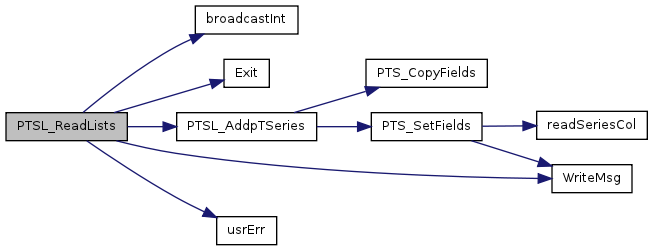
| void PTSL_CreatePointMap | ( | PTSeriesList * | pList, | |
| void * | Map, | |||
| unsigned char | Mtype, | |||
| int | step, | |||
| float | scale | |||
| ) |
Point Time Series interpolation (unused): generate interpolated spatial (map) data.
Definition at line 1258 of file Driver_Utilities.c.
References ON_MAP, PTSL_GetInterpolatedValue0(), s0, s1, and T.
Referenced by cell_dyn1().
01260 { 01261 int i0, i1; 01262 01263 switch(Mtype) { 01264 case 'f' : 01265 for(i0=0; i0<=s0+1; i0++) 01266 for(i1=0; i1<=s1+1; i1++) 01267 ((float*)Map)[T(i0,i1)] = (ON_MAP[T(i0,i1)]) ? PTSL_GetInterpolatedValue0(pList,i0,i1,step)*scale : 0.0 /*was this value (v0.5beta) -0.012 */; 01268 break; 01269 case 'i' : case 'd' : 01270 for(i0=0; i0<=s0+1; i0++) 01271 for(i1=0; i1<=s1+1; i1++) 01272 ((int*)Map)[T(i0,i1)] = (int) ( (ON_MAP[T(i0,i1)]) ? PTSL_GetInterpolatedValue0(pList,i0,i1,step)*scale : 0 ); 01273 break; 01274 case 'c' : 01275 for(i0=0; i0<=s0+1; i0++) 01276 for(i1=0; i1<=s1+1; i1++) 01277 ((unsigned char*)Map)[T(i0,i1)] = (unsigned char) '\0' + (int) ( (ON_MAP[T(i0,i1)]) ? PTSL_GetInterpolatedValue0(pList,i0,i1,step)*scale : 0 ); 01278 break; 01279 } 01280 }

| float PTSL_GetInterpolatedValue1 | ( | PTSeriesList * | thisStruct, | |
| int | x, | |||
| int | y, | |||
| int | step | |||
| ) |
Point Time Series interpolation (unused): at point, calculate inverse distance interpolation (unrestricted power of distance).
Definition at line 1283 of file Driver_Utilities.c.
References pTSeriesList::fList, pTSeriesList::fNSlotsUsed, pTSeries::fValue, pTSeries::fX, pTSeries::fY, GP_IDW_pow, RPL_AddrPoint(), RPL_Free(), RPL_Init(), and RPL_Sort().
01284 { 01285 int i, dx, dy; 01286 PTSeries pV; 01287 RPointList *pList; 01288 float wpow; 01289 double weight, InterpValue=0.0, distance=0.0; 01290 long r; 01291 01292 pList = RPL_Init( 20 ); 01293 wpow = GP_IDW_pow; /* GP_IDW_pow is "adjustable" parameter in global parm input file */ 01294 for(i=0; i<thisStruct->fNSlotsUsed; i++) { 01295 pV = thisStruct->fList[i]; 01296 dx = (pV.fX-x); 01297 dy = (pV.fY-y); 01298 r = dx*dx + dy*dy; 01299 if( r == 0 ) return pV.fValue[step]; 01300 RPL_AddrPoint(pList, dx, dy, r, pV.fValue[step]); 01301 weight = (wpow == 1.0) ? ((double)1.0)/r : pow(r,-wpow); 01302 InterpValue += pV.fValue[step]*weight; 01303 distance += weight; 01304 } 01305 RPL_Sort(pList); 01306 RPL_Free(pList); 01307 return (float) InterpValue; 01308 }

| void RP_SetFields | ( | RPoint * | thisStruct, | |
| int | ix, | |||
| int | iy, | |||
| float | r, | |||
| float | value | |||
| ) |
Point Time Series interpolation (unused):.
Definition at line 1311 of file Driver_Utilities.c.
References rPoint::fr, rPoint::fValue, rPoint::fX, and rPoint::fY.
Referenced by RPL_AddrPoint().
01312 { 01313 thisStruct->fX = ix; 01314 thisStruct->fY = iy; 01315 thisStruct->fr = r; 01316 thisStruct->fValue = value; 01317 }
Point Time Series interpolation (unused):.
Definition at line 1320 of file Driver_Utilities.c.
References rPoint::fr, rPoint::fValue, rPoint::fX, and rPoint::fY.
Referenced by RP_SwapFields(), and RPL_AddrPoint().
01321 { 01322 thisStruct->fX = that->fX; 01323 thisStruct->fY = that->fY; 01324 thisStruct->fr = that->fr; 01325 thisStruct->fValue = that->fValue; 01326 }
Point Time Series interpolation (unused):.
Definition at line 1329 of file Driver_Utilities.c.
References RP_CopyFields().
Referenced by RPL_Sort().
01330 { 01331 RPoint temp; 01332 RP_CopyFields (&temp, thisStruct); 01333 RP_CopyFields (thisStruct, that); 01334 RP_CopyFields (that, &temp); 01335 }

| RPointList* RPL_Init | ( | int | nPoints | ) |
Point Time Series interpolation (unused):.
Definition at line 1338 of file Driver_Utilities.c.
References rPointList::fList, rPointList::fNPt, and rPointList::fNPtUsed.
Referenced by PTSL_GetInterpolatedValue1().
01339 { 01340 RPointList *thisStruct; 01341 thisStruct = (RPointList*) malloc(sizeof(RPointList)); 01342 thisStruct->fList = (RPoint*) malloc(sizeof(RPoint)*nPoints); 01343 thisStruct->fNPt = nPoints; 01344 thisStruct->fNPtUsed = 0; 01345 return thisStruct; 01346 }
| void RPL_AddrPoint | ( | RPointList * | thisStruct, | |
| int | x, | |||
| int | y, | |||
| float | r, | |||
| float | value | |||
| ) |
Point Time Series interpolation (unused):.
Definition at line 1349 of file Driver_Utilities.c.
References rPointList::fList, rPointList::fNPt, rPointList::fNPtUsed, RP_CopyFields(), and RP_SetFields().
Referenced by PTSL_GetInterpolatedValue1().
01350 { 01351 RPoint* pointListtemp; 01352 int i, newPoints; 01353 01354 if( thisStruct->fNPtUsed >= thisStruct->fNPt ) { 01355 newPoints = 20; 01356 thisStruct->fNPt += newPoints; 01357 pointListtemp = (RPoint*) malloc(sizeof(RPoint)*(thisStruct->fNPt)); 01358 for(i=0; i<thisStruct->fNPtUsed; i++) { 01359 RP_CopyFields(pointListtemp+i,thisStruct->fList+i); 01360 } 01361 if( thisStruct->fList != NULL ) free((char*)thisStruct->fList); 01362 thisStruct->fList = pointListtemp; 01363 } 01364 01365 RP_SetFields( thisStruct->fList + thisStruct->fNPtUsed, x, y, r, value); 01366 thisStruct->fNPtUsed++; 01367 }

| void RPL_Sort | ( | RPointList * | thisStruct | ) |
Point Time Series interpolation (unused):.
Definition at line 1370 of file Driver_Utilities.c.
References rPointList::fList, rPointList::fNPtUsed, rPoint::fr, and RP_SwapFields().
Referenced by PTSL_GetInterpolatedValue1().
01371 { 01372 int i, go=1; 01373 01374 while(go) { 01375 go = 0; 01376 for(i=1; i<thisStruct->fNPtUsed; i++) if(thisStruct->fList[i-1].fr > thisStruct->fList[i].fr) { 01377 RP_SwapFields (thisStruct->fList+i-1, thisStruct->fList+i); 01378 go = 1; 01379 } 01380 } 01381 }

| void RPL_Free | ( | RPointList * | thisStruct | ) |
Point Time Series interpolation (unused):.
Definition at line 1385 of file Driver_Utilities.c.
References rPointList::fList.
Referenced by PTSL_GetInterpolatedValue1().
01386 { 01387 if(thisStruct == NULL) return; 01388 if( thisStruct->fList != NULL ) free((char*)thisStruct->fList); 01389 free((char*)thisStruct); 01390 thisStruct = NULL; 01391 }
(Effectively unused). From Model.outList data, set a flag indicating array or not
In reading the Model.outList, each line pertain to either a 2D array (variable) or a non-array varible/parameter. This function pertains to very early version of ELM (translating Stella models), and Model.outList always refers to variables that are arrays.
- Parameters:
-
vp struct of ViewParm w/ output configuration mask array mask value is always = 1 (is an array)
Definition at line 1405 of file Driver_Utilities.c.
References viewParm::flags.
Referenced by readViewParms().
Unused (never called) function.
Definition at line 1411 of file Driver_Utilities.c.
References viewParm::flags.
01412 { 01413 if( vp->flags & mask ) return 1; else return 0; 01414 }
| void setPrecision | ( | ViewParm * | vp, | |
| int | value | |||
| ) |
(Effectively unused).
Definition at line 1417 of file Driver_Utilities.c.
References viewParm::flags, PMASK1, and PMASK2.
Referenced by readViewParms().
01418 { 01419 if(value/3) vp->flags |= PMASK2; else vp->flags &= ~PMASK2; 01420 if((value-1)%2) vp->flags |= PMASK1; else vp->flags &= ~PMASK1; 01421 }
| int getPrecision | ( | ViewParm * | vp | ) |
(Effectively unused).
Definition at line 1424 of file Driver_Utilities.c.
References viewParm::flags, PMASK1, and PMASK2.
Referenced by write_output().
01425 { 01426 int rv = 1; 01427 if(vp->flags & PMASK2) rv +=2; 01428 if(vp->flags & PMASK1) rv +=1; 01429 return rv; 01430 }
| int check_for | ( | char * | s0, | |
| const char * | s1, | |||
| int | start, | |||
| int | cs, | |||
| int | rp | |||
| ) |
Check for occurrences of string s1 in string s0 after position start.
After position start, check for occurrences of string s1 in string s0.
- Parameters:
-
s0 String array s1 String array start Starting position cs Case sensitivity rp Return pointer to beginning or not
- Returns:
- location in string
Definition at line 1443 of file Driver_Utilities.c.
Referenced by write_map_file().
01444 { 01445 /* Check for occurrences of string s1 in string s0 */ 01446 /* after position start. Return -1 if not found. */ 01447 /* if cs = CASE -> case sensitive, cs = NOCASE, not case sens. */ 01448 /* if rp = BEG -> return position of beginning of s1, */ 01449 /* otherwise return position of (next char following the) end of s1 */ 01450 int i, j=0, k=-1, Len1 = strlen(s1), Len0 = strlen(s0); 01451 char t1, t2; 01452 01453 while(k<0) { 01454 k=0; 01455 for(i=start; i< Len0; ++i) { 01456 t1 = s0[i]; 01457 t2 = s1[j]; 01458 if(cs==NOCASE) { t1 = tolower(t1); t2 = tolower(t2); } 01459 if (t1 == t2) j++; 01460 else {j=0; k=0;} 01461 if(j==Len1) { k=1; break; } 01462 } 01463 } 01464 if(k<=0) return(-1); 01465 else if(rp==BEG) return(i-Len1+1); 01466 else return(i+1); 01467 }
| int isInteger | ( | char * | target_str | ) |
Determine if an integer is present in string.
- Parameters:
-
target_str Target string
- Returns:
- true or false (found int or not)
Definition at line 1475 of file Driver_Utilities.c.
Referenced by ReadStructures(), and readViewParms().
01475 { 01476 01477 int i=-1,first_num=0; 01478 char ch; 01479 01480 while( (ch=target_str[++i]) != '\0' ) { 01481 if( isdigit(ch) ) first_num=1; 01482 if( (ch=='-' || ch=='+') && first_num ) return(0); 01483 if( !( isspace(ch) || isdigit(ch) || ch=='-' || ch=='+') ) return(0); 01484 } 01485 return(1); 01486 }
| int isFloat | ( | char * | target_str | ) |
Determine if a float is present in string.
- Parameters:
-
target_str Target string
- Returns:
- true or false (found float or not)
Definition at line 1493 of file Driver_Utilities.c.
Referenced by ReadStructures(), and readViewParms().
01493 { 01494 01495 int i=-1,first_num=0; 01496 char ch; 01497 01498 while( (ch=target_str[++i]) != '\0' ) { 01499 if( isdigit(ch) ) first_num=1; 01500 if( (ch=='-' || ch=='+') && first_num ) return(0); 01501 if( !( isspace(ch) || isdigit(ch) || ch=='-' || ch=='+' || ch=='.' || toupper(ch) == 'E') ) return(0); 01502 } 01503 return(1); 01504 }
| void WriteMsg | ( | const char * | msg, | |
| int | wh | |||
| ) |
Send a message to a debug file or to the console.
Depending on when this function is called, messages are sent to one of two debug-related files, or to the console. During initial model set-up, the first (Driver0.out) debug-info file is used to print confirmation information on items such as init/end dates of simulation, the model parameter values that were read, etc. During later access to this function while the model is iterating, the second (Driver1.out) file is opened and accessed here, followed by the X'th for multi-run sensitivity analyses.
- Parameters:
-
msg A string message for printing wh Unused
Definition at line 1519 of file Driver_Utilities.c.
References Driver_outfile.
Referenced by cell_dyn1(), cell_dyn12(), cell_dyn2(), cell_dyn7(), cell_dyn8(), cell_dyn9(), Combine(), flowCalc_CanCan(), flowCalc_CanCel(), flowCalc_CelCan(), flowData_CanCan(), flowData_CanCel(), flowData_CelCan(), flowData_CelCel(), Flux_GWcells(), Flux_SWstuff(), FluxChannel(), get_global_parm(), get_hab_parm(), get_modexperim_parm(), get_Nth_parm(), get_parmf(), HabSwitch_Init(), main(), make_more_points(), print_point(), PTS_SetFields(), PTSL_ReadLists(), read_map_dims(), read_map_file(), read_model_parameters(), Read_schedule(), ReadModExperimParms(), readOutlist(), ReadStructures(), readViewParms(), SensiParm_list(), setup_grid(), write_map_file(), and write_output().
01519 { 01520 wh = 1; 01521 if(Driver_outfile) fprintf(Driver_outfile,"%s\n",msg); 01522 else fprintf(stdout,"%s\n",msg); 01523 fflush(stdout); 01524 }
| void usrErr0 | ( | const char * | dString | ) |
Send a message to the console.
The message text is not followed by a line feed.
- Parameters:
-
dString A string message to print
Definition at line 1530 of file Driver_Utilities.c.
Referenced by alloc_mem_stats(), alloc_memory(), horizFlow(), init_dynam_data(), init_eqns(), init_static_data(), main(), PtInterp_read(), rain_data_wmm(), read_model_parameters(), ReadModExperimParms(), ReadStructFlow_PtSer(), ReadStructTP_PtSer(), ReadStructTS_PtSer(), reinitBIR(), and reinitCanals().
| void usrErr | ( | const char * | dString | ) |
Send a message to the console.
The message text is followed by a line feed.
- Parameters:
-
dString A string message to print
Definition at line 1540 of file Driver_Utilities.c.
Referenced by alloc_mem_runs(), alloc_memory(), BIRinit(), Canal_Network_Init(), cell_dyn9(), evap_data_wmm(), flowCalc_CanCan(), flowCalc_CanCel(), flowCalc_CelCan(), get_global_parm(), get_hab_parm(), get_modexperim_parm(), get_Nth_parm(), get_parmf(), getCombineIndex(), HabSwitch_Init(), init_canals(), init_dynam_data(), init_eqns(), init_static_data(), local_setup(), main(), match_Sparm(), print_point(), PtInterp_read(), PTSL_ReadLists(), rain_data_wmm(), read_map_dims(), read_map_file(), read_model_parameters(), Read_schedule(), ReadChanStruct(), ReadModExperimParms(), ReadStructFlow_PtSer(), ReadStructTP_PtSer(), ReadStructTS_PtSer(), ReadStructures(), readViewParms(), reinitBIR(), reinitCanals(), SensiParm_list(), set_env_vars(), setup_platform(), and stage_data_wmm().
| void Exit | ( | int | code | ) |
Standard exit from program.
Definition at line 1548 of file Driver_Utilities.c.
Referenced by fatal(), get_global_parm(), get_modexperim_parm(), getCanalElev(), nalloc(), PTSL_ReadLists(), and read_map_dims().
| void fatal | ( | const char * | msg | ) |
Exit (code=9) from program after sending a message.
Definition at line 1551 of file Driver_Utilities.c.
References Exit().
Referenced by goto_index(), and print_point().
01552 { 01553 printf("%s",msg); 01554 fflush(stdout); 01555 Exit(9); 01556 }

| double julday | ( | int | mon, | |
| int | day, | |||
| int | year, | |||
| int | h, | |||
| int | mi, | |||
| double | se | |||
| ) |
Determine the Julian calendar day from a Gregorian date.
- Returns:
- julian day + hms as a real number
- Parameters:
-
mon Month day Day year Year h Hour mi Minute se Second
- Returns:
- Julian day
Definition at line 1583 of file Driver_Utilities.c.
Referenced by get_parmf(), readSeriesCol(), ReadStructFlow_PtSer(), ReadStructTP_PtSer(), and ReadStructTS_PtSer().
01584 { 01585 long m = mon, d = day, y = year; 01586 long c, ya, j; 01587 double seconds = h * 3600.0 + mi * 60 + se; 01588 01589 if (m > 2) 01590 m -= 3; 01591 else { 01592 m += 9; 01593 --y; 01594 } 01595 c = y / 100L; 01596 ya = y - (100L * c); 01597 j = (146097L * c) / 4L + (1461L * ya) / 4L + (153L * m + 2L) / 5L + d + 1721119L; 01598 if (seconds < 12 * 3600.0) { 01599 j--; 01600 seconds += 12.0 * 3600.0; 01601 } 01602 else { 01603 seconds = seconds - 12.0 * 3600.0; 01604 } 01605 return (j + (seconds / 3600.0) / 24.0); 01606 }
| void calcdate | ( | double | jd, | |
| int * | m, | |||
| int * | d, | |||
| int * | y, | |||
| int * | h, | |||
| int * | mi, | |||
| double * | sec | |||
| ) |
Determine the Gregorian date from a Julian calendar day.
Julian date converter. Takes a julian date (the number of days since some distant epoch or other), and returns an int pointer to static space. ip[0] = month; ip[1] = day of month; ip[2] = year (actual year, like 1977, not 77 unless it was 77 a.d.); ip[3] = day of week (0->Sunday to 6->Saturday) These are Gregorian. Copied from Algorithm 199 in Collected algorithms of the CACM Author: Robert G. Tantzen, Translator: Nat Howard. All taken (unmodified) from SFWMD HSM's /vol/hsm/src/libs/xmgr_julday/ directory.
- Parameters:
-
jd Julian day m Month d Day y Year h Hour mi Minute sec Second
Definition at line 1630 of file Driver_Utilities.c.
Referenced by send_point_lists2(), and track_time().
01631 { 01632 static int ret[4]; 01633 01634 long j = (long)jd; 01635 double tmp, frac = jd - j; 01636 01637 if (frac >= 0.5) { 01638 frac = frac - 0.5; 01639 j++; 01640 } 01641 else { 01642 frac = frac + 0.5; 01643 } 01644 01645 ret[3] = (j + 1L) % 7L; 01646 j -= 1721119L; 01647 *y = (4L * j - 1L) / 146097L; 01648 j = 4L * j - 1L - 146097L * *y; 01649 *d = j / 4L; 01650 j = (4L * *d + 3L) / 1461L; 01651 *d = 4L * *d + 3L - 1461L * j; 01652 *d = (*d + 4L) / 4L; 01653 *m = (5L * *d - 3L) / 153L; 01654 *d = 5L * *d - 3 - 153L * *m; 01655 *d = (*d + 5L) / 5L; 01656 *y = 100L * *y + j; 01657 if (*m < 10) 01658 *m += 3; 01659 else { 01660 *m -= 9; 01661 *y += 1; 01662 } 01663 tmp = 3600.0 * (frac * 24.0); 01664 *h = (int) (tmp / 3600.0); 01665 tmp = tmp - *h * 3600.0; 01666 01667 *mi = (int) (tmp / 60.0); 01668 *sec = tmp - *mi * 60.0; 01669 }
| float FMOD | ( | float | x, | |
| float | y | |||
| ) |
Modulus of a pair of (double) arguments.
- Parameters:
-
x Numerator y Denominator
- Returns:
- modulus (float) result
Definition at line 1675 of file Driver_Utilities.c.
Referenced by cell_dyn1(), CellAvg(), Flows_in_Structures(), gen_output(), init_eqns(), main(), and Run_Canal_Network().
| void getFloat | ( | FILE * | inFile, | |
| const char * | lString, | |||
| float * | fValPtr | |||
| ) |
Get a float value following a specific string.
- Parameters:
-
inFile File that is open lString The string being read fValPtr The float number found
Definition at line 1683 of file Driver_Utilities.c.
References scan_forward().
Referenced by get_parmf().
01684 { 01685 int test, fSize; 01686 UCHAR iEx=0; 01687 if(lString) scan_forward(inFile,lString); 01688 test = fscanf(inFile,"%f",fValPtr); 01689 if(test != 1) { 01690 fprintf(stderr,"Read Error (%d):",test); 01691 if(lString) fprintf(stderr,"%s\n",lString); 01692 *fValPtr = 0.0; 01693 iEx = 1; 01694 } 01695 if (iEx) exit(0); 01696 }

| void getChar | ( | FILE * | inFile, | |
| const char * | lString, | |||
| char * | cValPtr | |||
| ) |
Get a character following a specific string.
- Parameters:
-
inFile File that is open lString The string being read cValPtr The char value found
Definition at line 1702 of file Driver_Utilities.c.
References scan_forward().
01703 { 01704 int test; 01705 UCHAR iEx=0; 01706 if(lString) scan_forward(inFile,lString); 01707 test = fscanf(inFile,"%c",cValPtr); 01708 if(test != 1) { 01709 fprintf(stderr,"Read Error (%d):",test); 01710 if(lString) fprintf(stderr,"%s\n",lString); 01711 iEx = 1; 01712 *cValPtr = '\0'; 01713 } 01714 if (iEx) exit(0); 01715 }

| void getString | ( | FILE * | inFile, | |
| const char * | lString, | |||
| char * | inString | |||
| ) |
Get a string following a specific string.
- Parameters:
-
inFile File that is open lString The string being read inString The string found
Definition at line 1722 of file Driver_Utilities.c.
References scan_forward().
Referenced by get_parmf().
01723 { 01724 int test; 01725 UCHAR iEx=0; 01726 if(lString) scan_forward(inFile,lString); 01727 test = fscanf(inFile,"%s",inString); 01728 if(test != 1) { 01729 fprintf(stderr,"Read Error (%d):",test); 01730 if(lString) fprintf(stderr,"%s\n",lString); 01731 iEx = 1; 01732 } 01733 if (iEx) exit(0); 01734 }

| void getInt | ( | FILE * | inFile, | |
| const char * | lString, | |||
| int * | iValPtr | |||
| ) |
Get an integer following a specific string.
- Parameters:
-
inFile File that is open lString The string being read iValPtr The char value found
Definition at line 1740 of file Driver_Utilities.c.
References scan_forward().
Referenced by get_parmf().
01741 { 01742 int test; 01743 UCHAR iEx=0; 01744 if(lString) 01745 scan_forward(inFile,lString); 01746 test = fscanf(inFile,"%d",iValPtr); 01747 if(test != 1) { 01748 fprintf(stderr,"Read Error (%d):",test); 01749 if(lString) fprintf(stderr,"%s\n",lString); 01750 *iValPtr = 0; 01751 iEx = 1; 01752 } 01753 if (iEx) exit(0); 01754 }

| int find_char | ( | FILE * | infile, | |
| char | tchar | |||
| ) |
Find a character.
- Parameters:
-
infile The file that is open tchar The character being sought
- Returns:
- true/false (0 or 1)
Definition at line 1760 of file Driver_Utilities.c.
Referenced by get_Nth_parm(), and goto_index().
01761 { 01762 char test = '1', cchar = '#'; 01763 int in_c=0; 01764 01765 while( test != EOF ) { 01766 test = fgetc(infile); 01767 if(test == tchar && in_c==0 ) { return 1; } 01768 if(test == cchar ) in_c=1; 01769 if(test == '\n' ) in_c=0; 01770 } 01771 return(0); 01772 }
| int Round | ( | float | x | ) |
truncate (not rounding) to an integer
- Parameters:
-
x the value being operated on
- Returns:
- result
Definition at line 1777 of file Driver_Utilities.c.
Referenced by Channel_configure().
| char* Scip | ( | char * | s, | |
| char | SYM | |||
| ) |
Skip ahead in a string until next field.
- Parameters:
-
s A character array SYM The specific symbol being used to skip over
- Returns:
- Location in string
Definition at line 1788 of file Driver_Utilities.c.
References EOS.
Referenced by BIRinit(), get_hab_parm(), Read_schedule(), ReadStructFlow_PtSer(), ReadStructTP_PtSer(), ReadStructTS_PtSer(), and ReadStructures().
01789 { 01790 if(*s == SYM ) return ++s; 01791 while(*s != SYM && *s != EOS ) s++; 01792 if(*s != EOS) return ++s; 01793 else return s; 01794 }
| int skip_white | ( | FILE * | infile | ) |
Skip white space(s) in a file.
- Parameters:
-
infile
- Returns:
- success/failure
Definition at line 1800 of file Driver_Utilities.c.
Referenced by get_parmf(), and init_config_file().
01801 { 01802 int ch; 01803 01804 while( isspace(ch=fgetc(infile)) ) {;} 01805 if(ch==EOF) return 0; 01806 ungetc(ch,infile); 01807 return 1; 01808 }
| int scan_forward | ( | FILE * | infile, | |
| const char * | tstring | |||
| ) |
Scan forward until a particular string is found.
- Parameters:
-
infile The file being read tstring The sought-after string
- Returns:
- Success/failure
Definition at line 1814 of file Driver_Utilities.c.
Referenced by get_global_parm(), get_modexperim_parm(), get_parmf(), getChar(), getFloat(), getInt(), getString(), read_header(), read_map_dims(), and readSeriesCol().
01815 { 01816 int sLen, i, cnt=0; 01817 char Input_string[100], test; 01818 01819 sLen = strlen(tstring); 01820 while( ( test = fgetc(infile) ) != EOF ) { 01821 for(i=0; i<(sLen-1); i++) 01822 Input_string[i] = Input_string[i+1]; 01823 Input_string[sLen-1] = test; 01824 Input_string[sLen] = '\0'; 01825 if(++cnt >= sLen) { 01826 test = strcmp(Input_string,tstring); 01827 if( test == 0 ) return 1; 01828 } 01829 } 01830 return(-1); 01831 }
| char* name_from_path | ( | char * | name | ) |
Get the var name from a longer path/filename.
- Parameters:
-
name The var name & path
- Returns:
- Pointer to var name alone
Definition at line 1837 of file Driver_Utilities.c.
Referenced by quick_look().
01838 { 01839 char* namePtr; int i, slen; 01840 char dirCh; 01841 01842 namePtr = name; 01843 dirCh = '/'; 01844 slen = strlen(name); 01845 01846 for(i=0; i<slen; i++) { 01847 if( name[slen-i-1] == dirCh ) { namePtr = name+slen-i; break; } 01848 } 01849 return namePtr; 01850 }
| VOIDP nalloc | ( | unsigned | mem_size, | |
| const char | var_name[] | |||
| ) |
Allocate memory for a variable.
- Parameters:
-
mem_size The size of memory space var_name The variable's name
- Returns:
- Pointer to that memory
Definition at line 1857 of file Driver_Utilities.c.
References Exit(), fasync(), fmulti(), total_memory, and VOIDP.
Referenced by alloc_hab_hist(), alloc_mem_stats(), alloc_memory(), Canal_Network_Init(), Channel_configure(), initDataStruct(), read_map_file(), readSeriesCol(), ReadStructFlow_PtSer(), readViewParms(), setup_grid(), and write_map_file().
01858 { 01859 VOIDP rp; 01860 01861 01862 if(mem_size == 0) return(NULL); 01863 rp = (VOIDP)malloc( mem_size ); 01864 total_memory += mem_size; 01865 fasync(stderr); 01866 if( rp == NULL ) { 01867 fprintf(stderr,"Sorry, out of memory(%d): %s\n",mem_size,var_name); 01868 Exit(0); 01869 } 01870 fmulti(stderr); 01871 return(rp); 01872 }
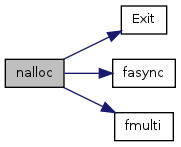
| float Normal | ( | float | mean, | |
| float | sd | |||
| ) |
Unused, never called. Normal distribution.
Definition at line 1875 of file Driver_Utilities.c.
References gRTable, and SMDRAND().
01876 { 01877 int table_loc ; 01878 double rand_num ; 01879 float sign ; 01880 float interval = .1 ; 01881 int n_interval = 40 ; 01882 float high, low ; 01883 float return_val = 0.0; 01884 01885 sign = SMDRAND(0.0, 1.0) ; 01886 sign = (sign < .5 ? -1 : 1) ; 01887 rand_num = SMDRAND(.5, 1.0); 01888 low = gRTable[0] ; 01889 for (table_loc=1; table_loc<n_interval; table_loc++) 01890 { 01891 high = gRTable[table_loc] ; 01892 if (high > rand_num + .5) 01893 { 01894 return_val = mean + sd * (sign * interval * (table_loc - 1 + 01895 (rand_num+.5-low)/(high-low))) ; 01896 return(return_val) ; 01897 } 01898 low = high ; 01899 } 01900 return(return_val) ; 01901 }

| int Poisson | ( | float | mu | ) |
Unused, never called. Poisson distribution.
Definition at line 1904 of file Driver_Utilities.c.
References Exp, and SMDRAND().
01905 { 01906 int ix; 01907 float f0, r, Lp = 1, xf = 1, p=0; 01908 01909 p = f0 = Exp(-mu); 01910 r = SMDRAND(0.0,1.0); 01911 01912 for( ix=0; ix<500; ix++) { 01913 if( r < p ) return ix; 01914 Lp *= mu; 01915 if(ix>0) xf *= ix; 01916 p += (Lp*f0)/xf; 01917 } 01918 return ix; 01919 }

| void link_edges | ( | VOIDP | Map, | |
| unsigned char | Mtype | |||
| ) |
Effectively unused in serial (non-parallel) implementation.
Definition at line 1924 of file Driver_Utilities.c.
References exchange_borders().
Referenced by read_map_file().
01925 { 01926 switch(Mtype) { 01927 case 'f' : 01928 exchange_borders((byte*)Map,sizeof(float)); break; 01929 case 'd' : case 'i' : 01930 exchange_borders((byte*)Map,sizeof(int)); break; 01931 case 'c' : 01932 exchange_borders((byte*)Map,sizeof(UCHAR)); break; 01933 } 01934 }

| void setup_platform | ( | ) |
Effectively unused in serial (non-parallel) implementation.
Definition at line 1937 of file Driver_Utilities.c.
References env, exgridcoord(), exgridinit(), exgridsplit(), exparam(), nprocs, nodenv::nprocs, nodenv::procnum, procnum, recpnum, and usrErr().
Referenced by setup().
01937 { 01938 01939 exparam(&env); 01940 procnum = env.procnum; 01941 exgridsplit(env.nprocs, 2, nprocs); 01942 if( exgridinit(2, nprocs) < 0) { usrErr("Failed to Setup Grid"); exit(0); } 01943 exgridcoord(procnum, recpnum); 01944 }
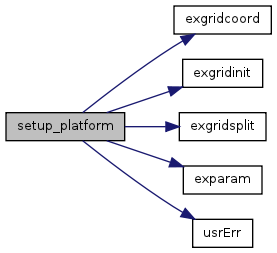
 1.5.6
1.5.6